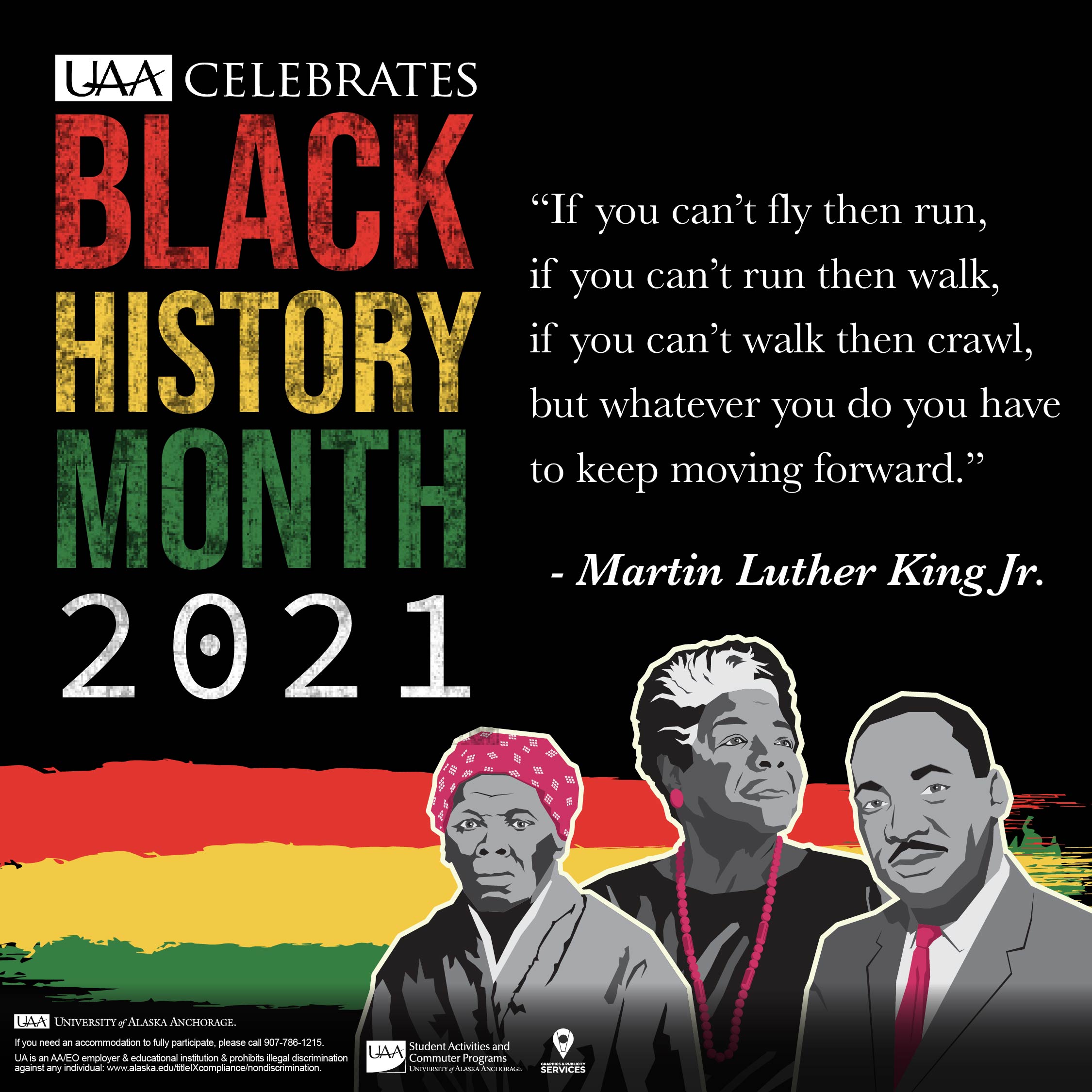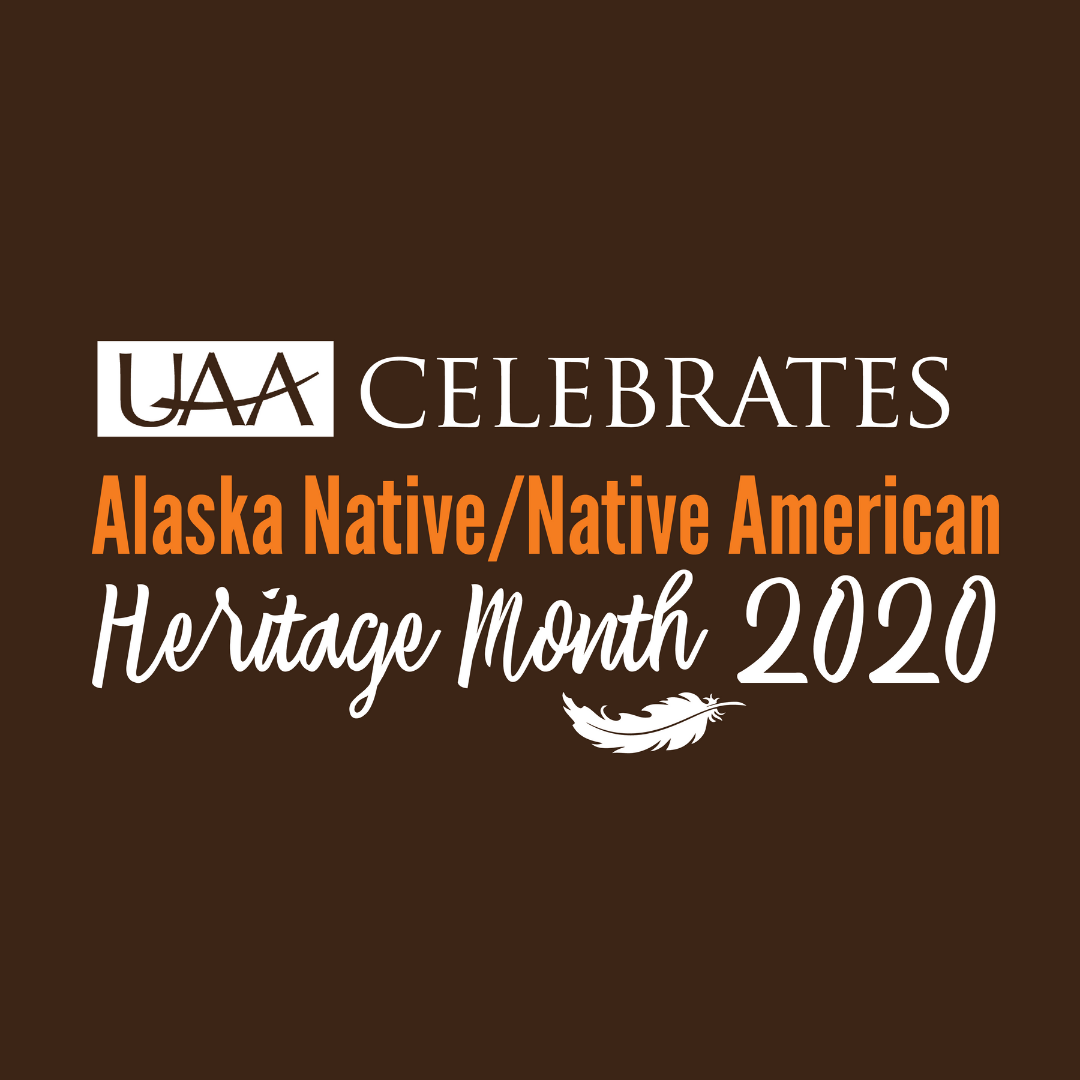YouAA Committee
Let's celebrate the YOU in UAA! Every Seawolf brings a unique perspective to the campus community; together, Seawolves represent an incredible, diverse range of cultural, heritage and intersectional identities that make the UAA community special.
YouAA Committee is open to all students/staff/faculty/alumni and community members who want to celebrate our diverse student body.

-
Pride Month (June)
June is Pride Month! 🏳️🌈Each June we reignite our dedicated efforts for LGBTQIA2S+ liberation by remembering the collective movement, including the catalyst for Pride month, the Stonewall Uprising and annual anniversary celebrations. Pride month is both a joyous celebration of social justice and civil rights progress, as well as a reminder of the ongoing need for social change. During this month, and all of the time, let us stand in solidarity with our queer and trans communities to celebrate Pride.
To learn more about the sexuality and gender expansive lexicon, check out The Pride Center’s Gender Terms handout.
Please Join Multicultural Student Services, The Pride Center, and Student Activities as we celebrate this month through student-driven programs and recommendations.
- UAA Undergraduate in Psychology, Hannah Huber
What does Pride Month mean to you?
I think pride month is exactly what's in the name. PRIDE! No matter your identity, pride month is all about being proud of yourself for being yourself. Understanding that the world is a hard place and being yourself is all you need to do. I think that recognizing the Stonewall Riots and how they were the start of pride is also important.Recommendations
I think learning about the Stonewall Riot of 1969 and spreading awareness of those events would be very impactful.
- UAA Undergraduate in Fine Arts, Taylor Lee
What does Pride Month mean to you?
Pride Month for me is an opportunity for LGBTQ+ to celebrate our identities, history, and the experiences that connect our community. Pride began as a political movement to bring visibility to our struggles, and to fight against oppressive systems that deny us our right to love, and express ourselves how we chose. We have made a great deal of progress since then. Acceptance for queer people has grown incredibly fast since I first came out, and it is easier than ever to connect with other people like myself!However despite the progress we are currently facing a political climate that seeks to remove queer people from the public eye. Legislation is being pushed to strip the rights of transgender people to exist in public spaces and receive medical care they need. Pride is about maintaining the spirit of our elders who fought for our right to not face discrimination in workplaces and housing, our right to not be criminalized for our gender expressions and attraction, and our right to marry our partners. It is about looking at our society today and asking how can we protect our community? How can we stand up for our brothers and sisters? How can we create opposition to the ideas and legislation that harm us? Who is standing in the way of a more accepting world?
Recommendations
I recommend reading Stone Butch Blues by Leslie Feinburg for an honest depiction of the stone butch identity and the struggles that come along with it. As for good queer music I recommend Chappell Roan, Orville Peck, and Tracy Chapman!
MSS + The Pride Center Recommend this powerful organizing and learning tool, Queering the Map that archives treasured queer memories, personal stories, and messages of encouragement from communities around the world. For a bit more history about Pride Month, we suggest this article by the Library of Congress. If you are interested in poetry, we recommend this compilation of LGBTQ+ Pride Poems by the Poetry Foundation. Check out this fabulous list of books about Queer Liberation, this short article about Five Pride Trailblazers you should know, and Geo Neptune’s excellent explanation of the term Two-Spirit, among a list of other video definitions from them magazine. We also recommend Casey McQuiston’s sci fi romance, Once Last Stop, and the heartwarming TV series, Heartstopper and Love, Victor.
Pride Month Events:
-
Pride Art! 🎨
June 21 | 4-6pm | UAA Pride Center
We’ll have multiple art projects (all supplies provided) food, music, and outdoor fun! This event is free, all ages, open to the community and family friendly.
We’re excited to celebrate self expression, pride and our community with y’all!!!!!
Join the UAA Pride Center and Student Activities in celebrating our LGBTQIA2S+ community with these local events:
Pride events around Anchorage:
- Spenard Pride Market (June 8)
- Pride Art at UAA (June 20)
- Diversity in the OUTdoors Solstice Party & Bike Ride (June 20)
- Pride Plant Swap (June 22)
- Pride Films at Bear Tooth Theatre (June 24)
- Drag Story Hour (June 27)
- Pride Block Party at Writer’s Block (June 29)
- Pride Festival and Parade (June 29)
- Pride Resource & Health Fair (June 30)
Pride events around Alaska (in and outside Anchorage):
- Indigiqueer appearances (all month long)
- Seward Pride (June 7-9)
- Homer Pride (all month long)
- Soldotna Pride (June 22)
- Underground Pride (July 20)
- UAA Undergraduate in Psychology, Hannah Huber
-
Asian Pacific Islander and Desi American Heritage Month (May)
May is Asian Pacific Islander and Desi American Heritage month. Since many seawolves are away from campus in May, we are celebrating these communities in April and on into the month of May. During this time we will reignite our focus and energies in recognizing and celebrating these incredibly diverse communities. While we want to honor the incredible accomplishments of the many APIDA communities, we must also take this opportunity to condemn the violence and hatred that has been directed to these communities. Let us stand together as a university to move towards racial justice and healing, as well as the overall pursuit of equity.
APIDA represents the racial categorization of those with roots and ancestry in the Pacific Islands, East Asia, South Asia and Southeast Asia, which contains at least 60 different ethnic groups with distinct cultures, histories, languages, and traditions.
- Asian American is a racial categorization and a self-determined political identity of solidarity and collective action stemming from the Ethnic Studies activism of the 1960s.
- Pacific Islanders refer to those whose origins are the original peoples of Polynesia, Micronesia, and Melanesia. Although Pacific Islanders have been categorized along with Asian Americans in federal data, this renders these communities invisible in large scale data and leaves these communities out of many national narratives.
- Desi American: Desi is a term that refers to those with ethnic roots in South Asia. The term Desi
is used differently in the US and UK in reference to those part of the South Asian
diaspora, than it is in South Asia. At UAA, we include Desi in our APIDA heritage
month name to specifically pull out Desi identities, as many Desi Americans do not
feel represented by the term Asian American.
Please Join Multicultural Student Services, The Pride Center, and Student Activities as we celebrate this month through student-driven programs and recommendations.
The APIDA Heritage Month Planning Committee, MSS + The Pride Center Recommend the powerful climate justice poetry of Kathy Jetnil-Kijiner, including Tell Them; the historical legacy and photography of Corky Lee, who helped shaped Asian American political identity through his iconic photojournalism, the powerful music of Filipina activist and rapper, Ruby Ibarra, and Hasan Minhaj’s interview with Desi American kids about growing up Desi in the United States.If you are interested in reading, we recommend Hawaii's Story by Hawaiis Queen Liliʻuokalani and Cristina Ongs Dreamweaving Essay about ancestors and generational shifts. We must also include Make Us Visible, a community organization advocating for the inclusion of Asian American history in k-12 curriculum and the beautiful community and website, Mixed Asian Media, that portrays the multitude of ways of being mixed and Asian.
- UAA Undergraduate in Health Sciences and Psychology, Maisha Chowdhury
What does APIDA Heritage Month mean to you?
It serves as a platform for our community, particularly the Desis, to proudly showcase and celebrate our rich cultural heritage and traditions. It gives us a unique opportunity to share aspects of our identity with the entire university community, fostering understanding, appreciation, and inclusivity. Moreover, this month allows us to commemorate the achievements, contributions, and struggles of our community throughout history.Recommendations
I recommend the Songs Oviman by Tanveer Evan, Hsun by Anuv Jain, and Tere Baaton Mein Aisa Uljha Jiya by Raghav because they authentically reflect the diversity and richness of my culture, showcasing its vibrant essence through a variety of musical styles and expressions
- UAA Undergraduate in Art with an Emphasis on Graphic Design, Charlize Sidro
What does APIDA Heritage Month mean to you?
To me, APIDA Heritage Month is an opportunity for those of Asian, Pacific Islander, and Desi heritage to celebrate the rich tapestry of our cultures, traditions, languages, and experiences within our communities. However, I also see this month as an opportunity to celebrate with each other as we recognize how connected and diverse our experiences, histories, and struggles are. Through this, we can foster an understanding and appreciation among people of all backgrounds and identities, playing a vital role in promoting cultural appreciation, social justice, and inclusivity in our community as a whole.Recommendations
- Everything Everywhere All at Once, a film by Daniel Kwan and Daniel Scheinert: I watched this film for the first time earlier this year, and it definitely resonated with me as an Asian American daughter. The movie explores themes such as love, family, identity, and the search for meaning. I feel like anyone from any cultural background may be able to find elements of their own lives reflected in this film.
- My Heart of Rice: A Poetic Filipino American Experience by Ashley C. Lanuza: I highly recommend this poetry collection for anyone trying to navigate their unconventional relationship with their cultural identity. One quote that particularly stood out to me is, "[Filipino] food was the consistent connection to my 'Filipino-ness,' “ and I related to that strongly as my mother's home-cooking is what introduced me to my culture growing up.
- BTS: I listened to a lot of K-pop growing up, but BTS is the group that has had the biggest impact on me. I recommend giving their music a listen, as many of their songs feature thought-provoking lyrics that address topics like mental health, self-love, social issues, and personal growth. They've also had a significant cultural impact in breaking barriers and challenging stereotypes in the global music industry.
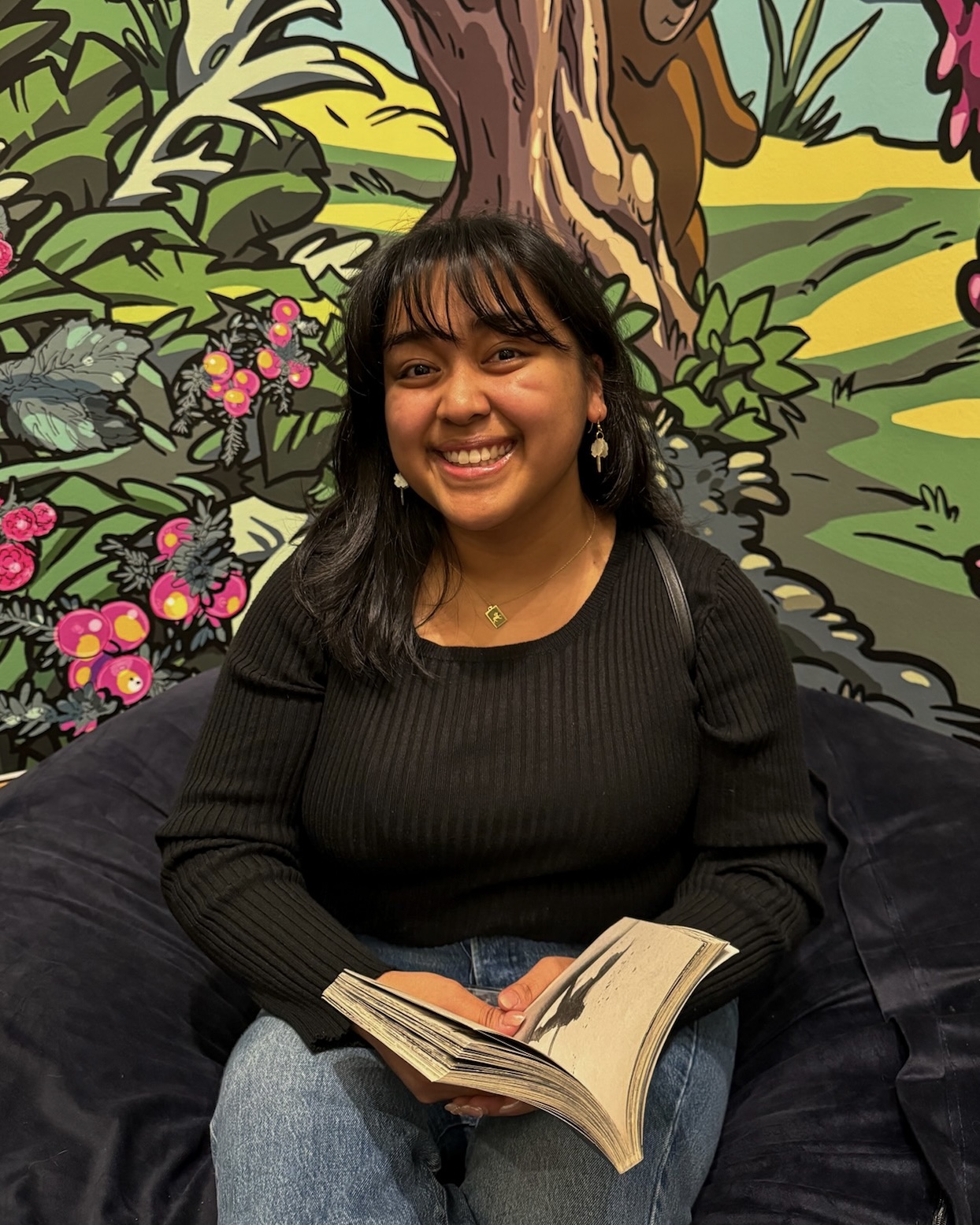
Asian Pacific Islander and Desi American Heritage Month Events:
-
APIDA & Arab Culture Jam |
April 16 I 6-8pm I SU Den
Celebrating Asian, Pacific Islander, Desi, and Arab American culture and students with food, performances, and community! Calling on those who identify as APIDA and/or Arab to perform and share their authentic selves or culture through a song, dance, spoken word, and other forms of art. Sign up here: tinyurl.com/APIDAArabJam
-
Karaoke Game Night: APIDA & Arab Culture |
April 18 I 5-7pm I Student Union Den
This is the last BIPOC Karaoke Game Night of the semester! Celebrate Asian, Pacific Islander, Desi, and Arab American culture this April for APIDA Appreciation and Arab American Heritage Month. Bring a friend and enjoy free food, karaoke, games, and educational materials.
-
Kabayan Halo Halo Night |
April 22 | 6:30-8pm | Multicultural Student Services (RH 106)
Meet your fellow Kabayan at UAA and join Kabayan Community for an evening of delicious halo-halo!
-
People of Oceania APIDA Potluck |
May 1 | 5-8pm | Student Union Den
Kick off the start of National APIDA Heritage Month with the UAA People of Oceania Association (POA)!
-
Pacific Island Cultural Flag Day |
May 25 | 12-6pm | Delaney Park Strip
Hosted by the Polynesian Association of Alaska and co-hosted by PI and Asian communities, celebrate APIDA with food, entertainment, and more!
-
Arab American Heritage Month (April)
April is National Arab American Heritage Month. This month we highlight the multitude of backgrounds, faiths, and traditions that make up Arab American communities. This month and all months, we honor the incredible historical contributions Arab Americans and Arab communities in the United States have made. Let us also recognize this month with a balance of celebration and love, as well as a sense of urgency for social change. As the UAA community, we are called to elevate the myriad voices that make up Arab American Communities while also working to eradicate Islamophobia and anti-Arab racism.
Arab American Heritage Month is an opportunity to learn more about these commonly miscategorized and misrepresented groups. Arab American refers to those who have roots or trace their ancestry to one of the 22 Arab nations, a group of countries mainly located in Western Asia and North Africa where Arabic is the common language, but not the only language spoken. In the United States, the majority of Arab Americans originate from Syria, Lebanon, Palestine, and Jordan. Arab Americans practice a multitude of faiths, and while Islam is a common faith, many Arab Americans practice Christianity, Judaism and other faiths or are secular.
According to the Arab American Institute there are 3.7 million Arab Americans, but because of our systems of racial categorization, the U.S. Census undercounts this population. There is currently advocacy to add a Middle East and North African (MENA) category on the US Census.
As a university community, let us take this month to reignite our learning and passion to create a more equitable UAA. Let us celebrate the achievements and resilience of Arab American communities and engage in meaningful opportunities to increase the love, care and joy we share with our Arab American community.
Please Join Multicultural Student Services, The Pride Center, and Student Activities as we celebrate this month through student-driven programs and recommendations.
The Arab American Heritage Month Planning Committee, MSS + The Pride Center Recommend the fabulous Queer Crescent (ig) advocacy collective that centers LGBTQIA+ Muslims, the informative Detroit Public Television series, Arab American Stories, the virtually accessible Arab American Museum Core Galleries, this brief online book about Arab American immigration history Arab Americans: History, Culture & Contributions from the Arab American National Museum. If you are adding to your reading list, we also suggest How Does it Feel to Be a Problem: Being Young and Arab in America by Moustafa Bayoumi which addresses the lives of Arab Americans in the United States in a post-9/11 world and this curated list of books about Arabs and Arab Americans by Social Justice Books with categories for kids, young adults and adults. We also recommend watching “Mo,” a captivating series that follows the journey of Mo, who straddles the line between two cultures. Additionally, don't miss his hilarious stand-up comedy specials, 'Mo Amer: The Vagabond,' and 'Mo Amer: Mohammad in Texas,' a side-splitting exploration of cultural experiences and identity.
- UAA Undergraduate in Foreign Policy & International Relations, Chuol Both Mut
What does National Arab American Heritage Month mean to you?
This identity month means a lot to me. It means getting the opportunity to not only educate others about what it means to be a Sudanese or Arab American, but it is also the identity-based month we are most cherished by binding together to celebrate the history and huge contributions that Arab Americans have made to American history.
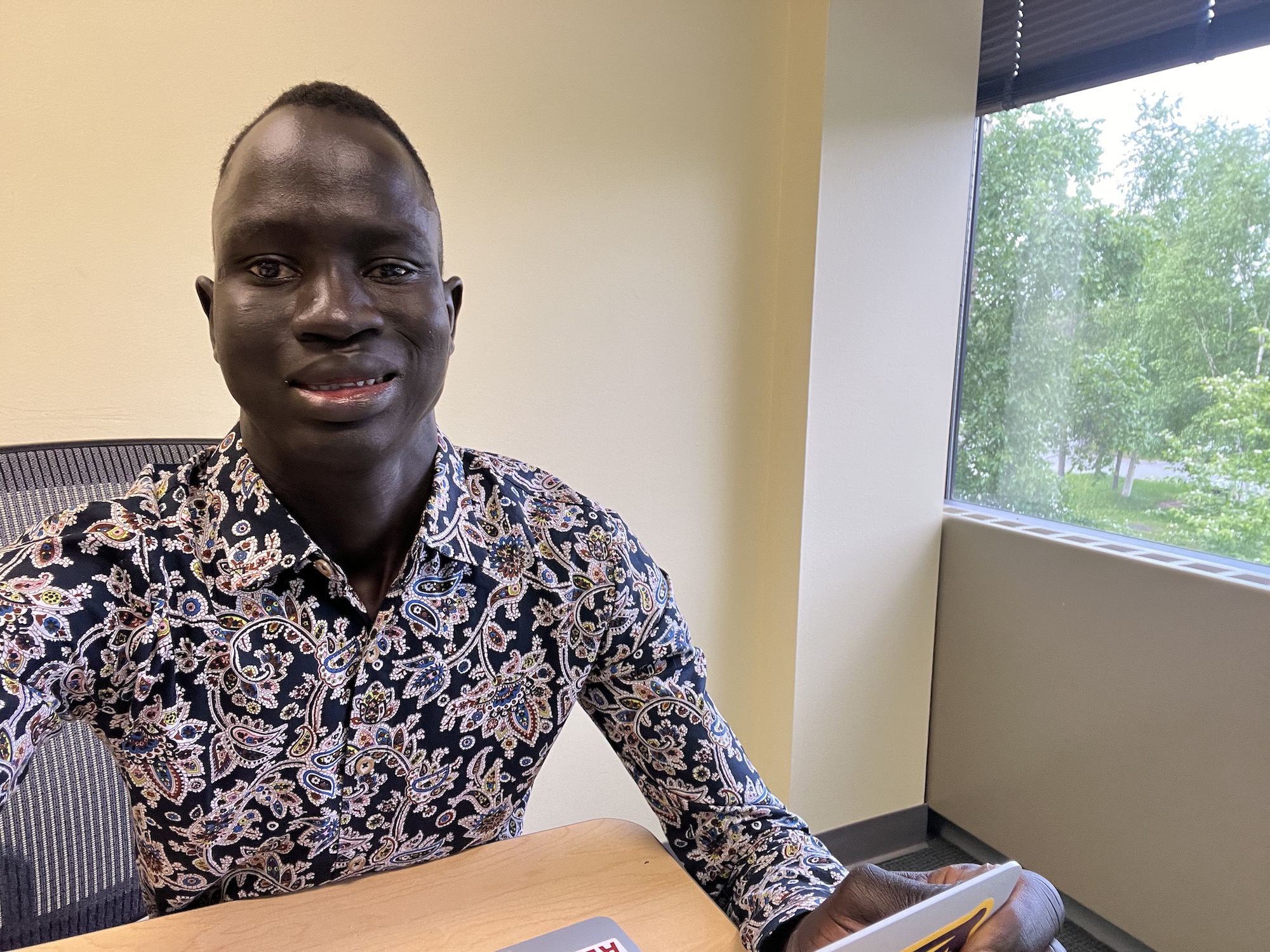

Arab American Heritage Month Events:
-
Noon Music feat. DJ Desert Rose [Bay] April 3 I 12-1pm I SU Cafeteria
DJ Desert Rose, hailing from the vibrant music scene of Saudi Arabia, is an emerging talent on a mission. Their unique musical journey revolves around crafting an electrifying fusion of global sounds, with a particular focus on the rich tapestry of SWANA (Southwest Asian and North African) cultures.
-
Henna Night Fundraiser April 7 | 2-5:00pm | MSS, RH 106
Join Muslim Student Association (MSA) for a festive Henna session, a cherished tradition before Eid, celebrating the rich cultural heritage of the Arab and Desi communities. All Are Welcome! $10/both palms.
- MSA Eid al-FitrApril 11 I 6-8:30pm I SU DenJoin the Muslim Student Association (MSA) and MSS in celebrating the end of Ramadan. Games, delicious food, and great connections! All are welcome.
-
APIDA & Arab Culture JamApril 16 I 6-8pm I SU Den
Celebrating Asian, Pacific Islander, Desi, and Arab American culture and students with food, performances, and community! Calling on those who identify as APIDA and/or Arab to perform and share their authentic selves or culture through a song, dance, spoken word, and other forms of art. Sign up here: tinyurl.com/APIDAArabJam
-
Karaoke Game Night: APIDA & Arab Culture April 18 I 5-7pm I Student Union Den
This is the last BIPOC Karaoke Game Night of the semester! Celebrate Asian, Pacific Islander, Desi, and Arab American culture this April for APIDA Appreciation and Arab American Heritage Month. Bring a friend and enjoy free food, karaoke, games, and educational materials.
- UAA Undergraduate in Foreign Policy & International Relations, Chuol Both Mut
-
Women's History Month (March 2024)
March is Women’s history month. While we must celebrate women and their achievements at all times, we also highlight women in the month of March to bring attention to the reality that stories, success, and achievements disproportionately highlight men. Let us recognize the strength of women and their indelible contributions to humanity.
The National Women’s History Alliance’s designated theme for Women’s History Month 2024 is, “Women who Advocate for Equity, Diversity, and Inclusion.” This theme brings to mind the critical importance of recognizing whose stories are overlooked and silenced, including those of women of color, queer women and trans women. This month is significant because it serves as a reminder to bring curiosity to which stories we hear most often and reflect on which stories we must search harder to find and share.
As a community, let us continue our commitments to build a more just and inclusive university community for women, especially women of color, and queer and trans women. Let us also remember that women’s fight for equity, and the elevation of silenced histories are intertwined with our larger UAA commitments to embrace diversity and inclusion.
Please Join Multicultural Student Services, The Pride Center, and Student Activities as we celebrate this month through student-driven programs and recommendations.
The Women’s History Month Planning Committee, MSS + The Pride Center recommend the short, but moving spoken word performance of Shrinking Women by Lily Meyer; the powerful reflection of motherhood, race, and class in Celeste Ng’s Little Fires Everywhere (also a fantastic TV Series); this powerful gallery and slideshow about 7 Transgender Women who Made History; the iconic song, Sad Femme Club by Kimmortal; and the powerful historic Combahee River Collective Statement (1977) that describes the urgency for collective action to dismantle the interlocking systems of racism and sexism.
- UAA Undergraduate in Biological Sciences, Fotokalafi Vea
What does Women’s History Month mean to you?
This month is all about highlighting and celebrating the many inspirational Femme figures throughout history - though we should be doing that always. It's a time to appreciate how far we've come, a time to reflect on the many stories, achievements and struggles of femme identities and serves as a reminder that plenty of work still needs to be done to achieve the justice, equity, diversity and inclusivity that we deserve.Recommendations
- TV shows: Adventure Time - for the good vibes, hidden meaningful storylines and the character arcs. (Extra credit for reading about Adventure Time through a feminist critique lens.)

- UAA Undergraduate in Art, Sulynnette Vega Ledesma
What does Women’s History Month mean to you?
To have bold, strong, and smart women takes no for an answer. Women are leaders who will take us to a better future.Recommendations
- The Dressmaker (movie, 2015)- Tilly returns after many years of being ostracized to her small hometown to take care of her mother. Through her resilience and creativity, she seeks revenge on the small town that did her wrong.
- Zendaya is an icon and positive influence to me. She has taught me to push what I believe in and to fight for what I want in life. I have watched Zendaya since the show "Shake It Up". Her icon fashion wear and her way to make a difference in the world.
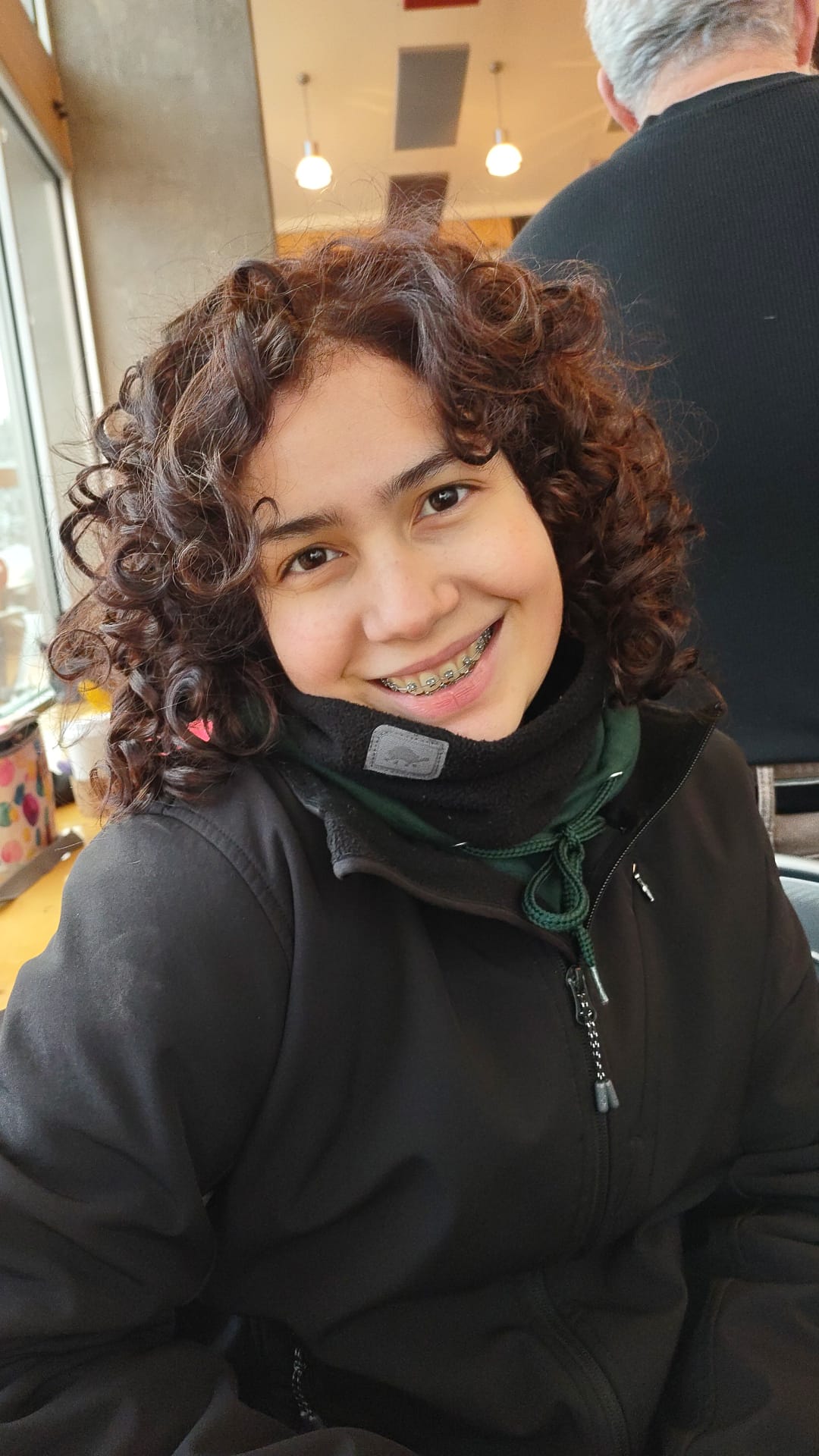
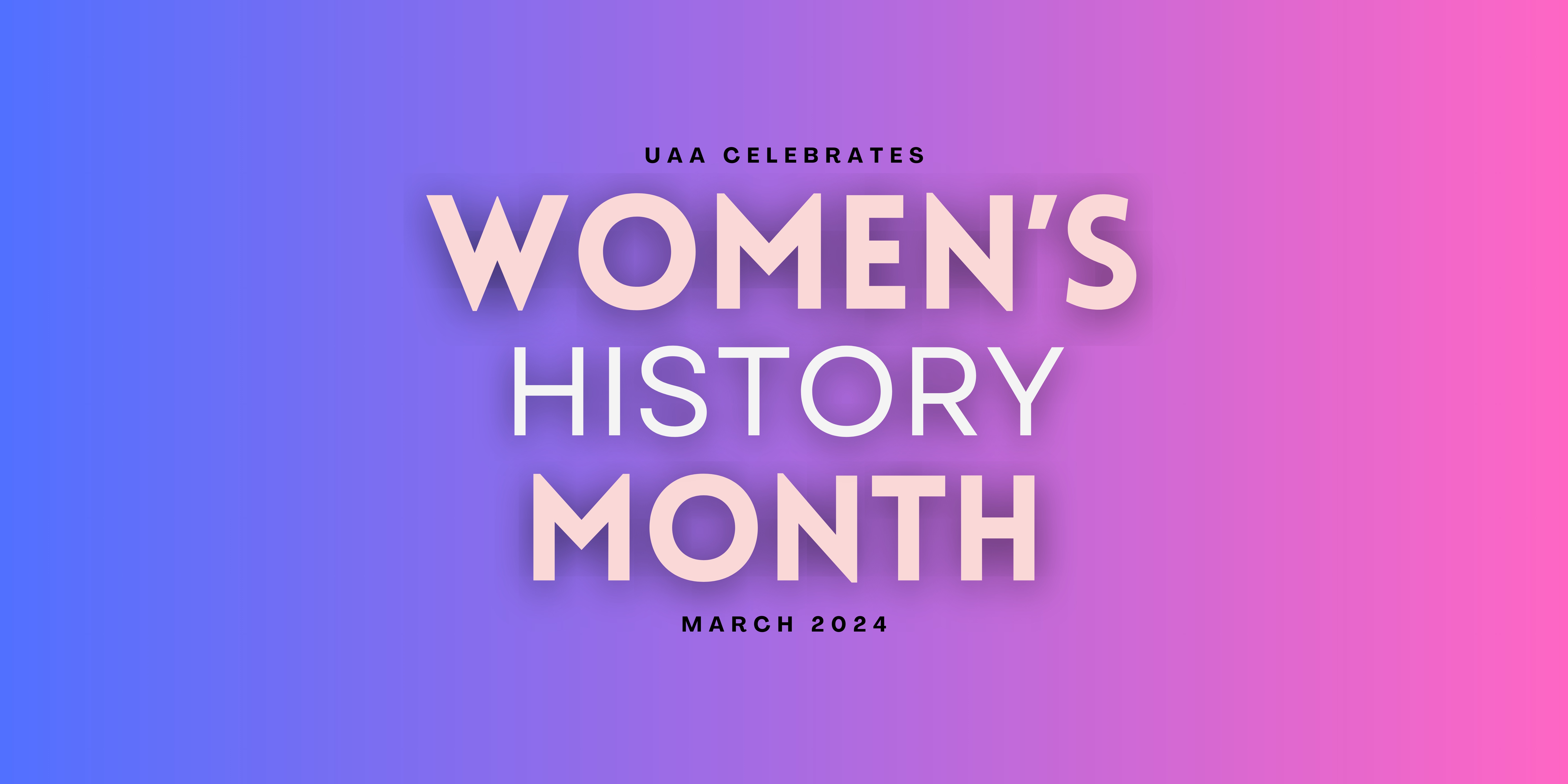
Women's History Month Events:
-
SG Monthly Mixer: Women's History Month Celebration | March 8 | 4–7 pm | Varsity Sports
Grill (4th floor of the Alaska Airlines Center)
Join us at the Varsity Grill for March's Monthly Mixer celebrating Women's History Month! Enjoy the standard $6 menu but keep your eyes peeled for a secret menu item as well as a complimentary mocktail. But wait, there's more! UAA invites nominations for outstanding women on campus. Whether you would like to highlight university, community, or personal achievements of the employee, let's celebrate them! Submitted details will feature on a rotating slideshow, each slide displayed for 30 seconds between 4–7 pm at the Varsity Sports Grill.
-
Femme Fest: Reclaiming of Women’s History Beyond Boundaries | March 19 | 4-6pm I Student
Union Cafeteria
Join with us in uplifting untold narratives of BIPOC femme folks who have led and continue to lead history in the making. Come for the nourishment (food, entertainment, convos, laughter, new knowledge, etc.) and leave grounded in a fuller illustration of the expansive history that Women’s History Month strives to amplify.
- BIPOC Karaoke: Celebrating Women of Color | March 20 | 5-7pm | Student Union DenMarch is Women’s History Month! UAA Multicultural Student Services is intentionally centering Black, Indigenous, and People of Color (BIPOC) communities who identify as women or femme. Enjoy a night of free food, karaoke, games, and community!
- UAA Undergraduate in Biological Sciences, Fotokalafi Vea
-
Black History Month (February 2024)
February is Black History Month, also referred to as Celebration of the African Diaspora and African American History Month. This month, and every month, we must acknowledge the profound contributions that Black individuals and communities have made throughout history. Let us recognize this month with a balance of celebration and reflection as well as a sense of urgency and continued need for social change. As a community we are called to amplify and preserve Black stories, particularly in response to large scale efforts to minimize them.
Black History Month is not only an opportunity to acknowledge the achievements and resilience of the Black community but also to engage in meaningful dialogue about racial healing and the pursuit of equity. As a university community, we must re-energize our commitments to social justice and actively support the Black, African American, and African Diaspora communities, as well as all marginalized groups.
Please Join Multicultural Student Services, The Pride Center, and Student Activities as we celebrate this month through student-driven programs and recommendations.
The Black History Month Planning Committee, MSS + The Pride Center Recommend the incredible and prophetic works of Octavia Butler, including The Parable of the Sower, in conjunction with the Podcast Octavia’s Parables by Toshi Reagon and adrienne maree brown, Ta-Nehisi Coates paradigm shifting essay, The Case for Reparations, and for a meditation on ways of being, Alexis Pauline Gumbs’ Undrowned: Black Feminist Lessons from Marine Mammals.
If you are more interested in watching something than reading or listening, we suggest the documentaries, The Cost of Inheritance: Reparations in the United States and Descendant, as well as the classic Spike Lee movie, School Daze and the show Rap Sh!t by Issa Rae.
If you’d prefer to listen to something, we recommend three albums: Kendrick Lamar’s To Pimp a Butterfly, Beyonce’s Renaissance, and Black Star’s No Fear of Time.
Black history is American history and in order to understand how to create a more equitable society, we must learn from the past. We highly recommend the Crash Course Black American History. In 51 episodes, Dr. Clint Smith teaches “about the experience of Black people in America, from the arrival of the first enslaved Black people who arrived at Jamestown all the way to the Black Lives Matter movement.”
- UAA Undergraduate in Psychology, Jasmine Jones
What does Black History Month mean to you?
“I am proud to be a Black woman who comes from a lineage of people who are brilliant, beautiful, resilient, loyal, and intelligent. The celebration of our people may be nationally recognized during a single month, but I feel pride and honor to be part of this community year-round.”Recommendations
“I want to highlight black figures from various professional fields and share our accomplishments because there is much of what people use everyday that they don't realize was created by black people.”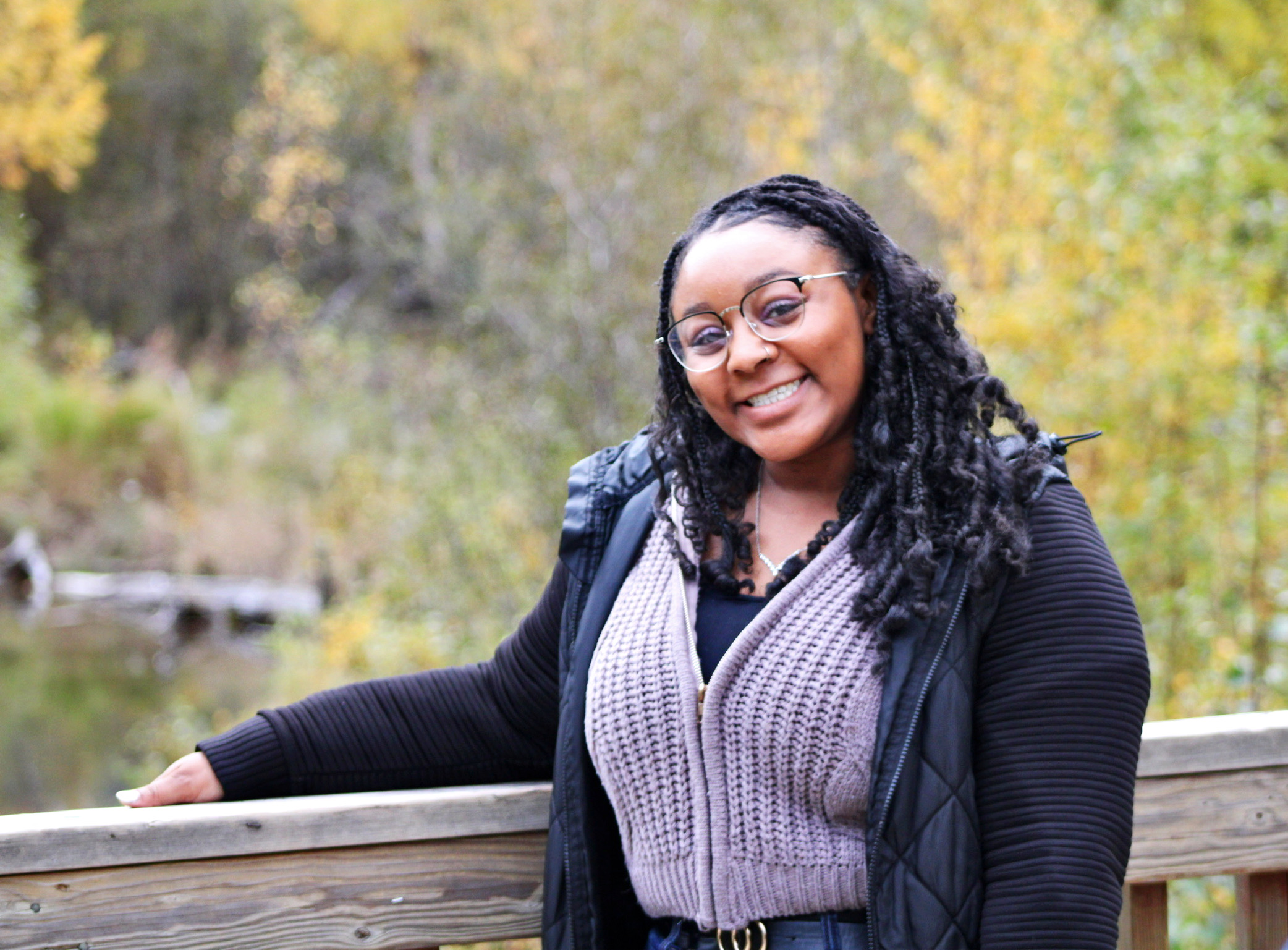
- UAA Undergraduate in Social Work, Tamia Yardlee BuntonWhat does Black History Month mean to you?
“Black History Month is a special time in which we recognize and celebrate those who make up Black history, whether that be past, present, or future. It is a time where we celebrate one another through fellowship, food, music, dancing, discussion, and so much more! Being Black American or African American is more than an identity, it is a beautiful and joyous culture that has been developed through tests, trials, and victories. Let me tell you, I am so blessed to be a part of such an amazing culture!”
- UAA Undergraduate in Social Work, Ugo Destiny Woko
What does Black History Month mean to you?
“Black History Month means connecting with my culture and taking pride in my heritage. I'm a daughter to immigrant parents who value this country and the freedoms we experience here, as well as the uniqueness of our Nigerian culture. It's a time where I can share my language, customs, traditions, and norms with those who don't know anything about it.”Recommendations
Just Mercy (movie, 2019)
Selma (movie, 2014)
The song Glory by Common and John Legend
The song Stand Up by Cynthia Erivo, performed at the 2020 Oscars
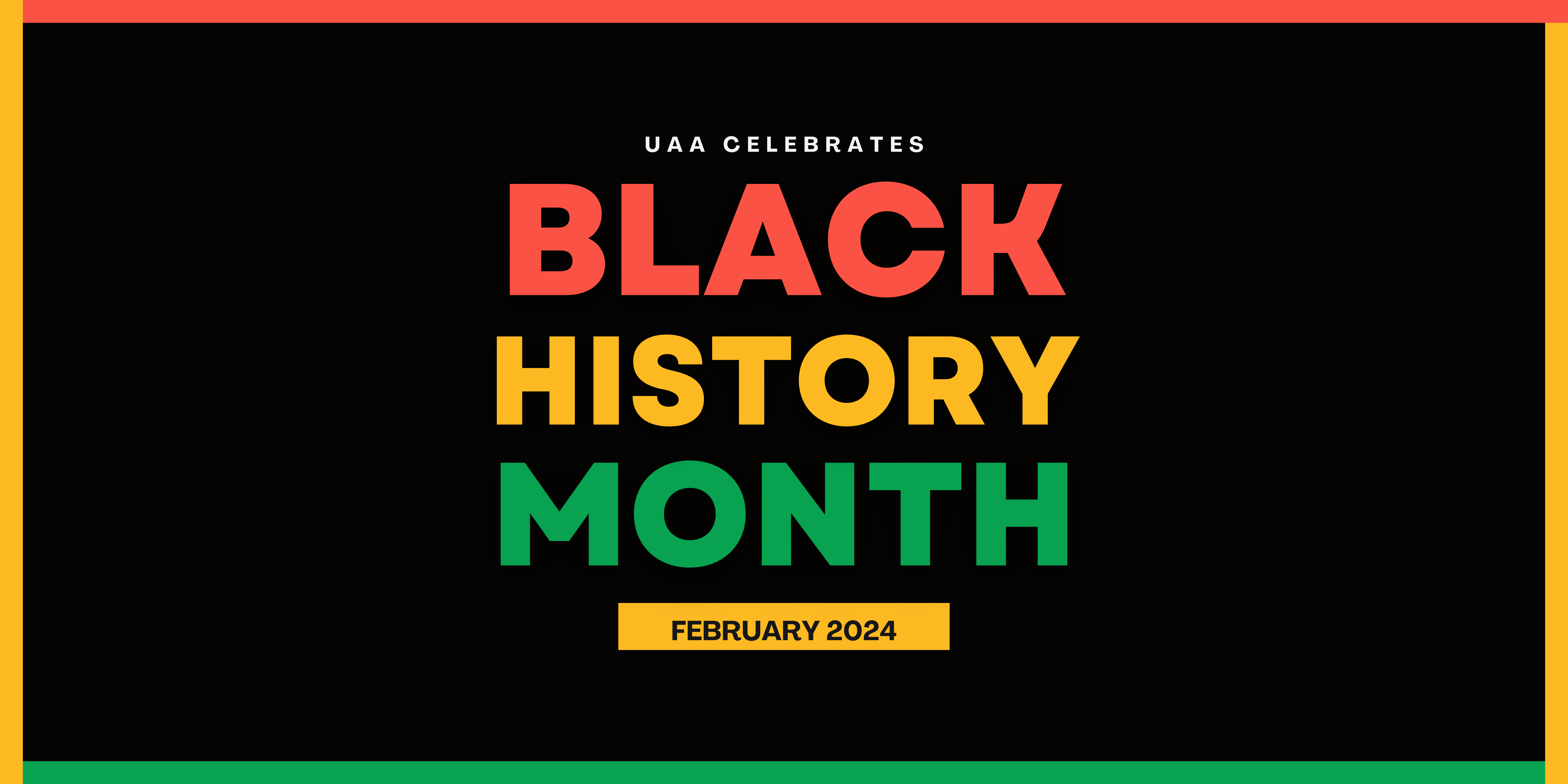
Black History Month Events:
- Empower Series: Complexifying MLK | 2/1/2024 | 3-5pm | Multicultural Student Services
(RH106)A facilitated dialogue about Martin Luther King, Jr. and parts of his legacy we don’t often see portrayed. We’ll explore his writing and how his full message empowers us to pursue coalition building and solidarity.
- Community Event Highlight: Anchorage Museum Free Admission & 9th Annual Alaska Black
Business Expo + Summit | 2/3/2024 | 10am-6pm | Anchorage MuseumFree admission to the Anchorage Museum from 10am-6pm with the Black Business Expo + Summit running from 1-5pm.
- Noon Music Featuring DJ Covy | 2/7/2024 | 12pm | Student UnionMeet Chris, aka "DJ Covy" — a musical virtuoso who has left an indelible mark in cities across the nation and with performances at venues like Williwaw, Mad Myrnas, and Avenue Bar. Notably, he's been the opening DJ for iconic acts such as The Ying Yang Twins, A-Trak, Shwayze, Bubba Sparks, and more.
-
Community Event Highlight: 5th Annual Bettye Davis African American Summit | 2/10/2024
| 9am-5pm | Bettye Davis East Anchorage High School
The 5th annual Bettye Davis African American Summit will take place on Saturday, February 10th from 9 AM to 5 PM at the Bettye Davis East Anchorage High School. The theme is “Marching Until Equity, Equality and Justice is Won!”The summit provides a forum for the Black community to educate policy makers and the public about the issues facing BIPOC (Black Indigenous People of Color) communities and the solutions we want to see. The Summit addresses critical issues of public policy in the areas of economics, justice, education, and health. It is the principal gathering place, idea generator, and voice for the Black community in Alaska. This year will incorporate “REP,” Registration, Education and Participation” – ABC’s voting platform to encourage voting in marginalized communities.
-
Being Black, Affinity Social Event | 2/13/2024 | 4-6pm | Multicultural Student Services
(RH106)
Being Black is an affinity space for students, staff, and faculty to discuss the experiences of being black. This is part of the Being series and refreshments will be provided.
-
Noon Music Featuring DJ Aud | 2/14/2024 | 12pm | Student Union
Celebrate the 38th anniversary of KRUA 88.1 FM with a special noon music event. This milestone occasion will be headlined by the dynamic beats of DJ Aud!
-
Film Screening & Discussion of “Stamped From The Beginning: The Definitive History
of Racist Ideas in America” | 2/20/2024 | 4pm | Student Union Den
A free film screening and discussion of "Stamped From The Beginning: The Definitive History of Racist Ideas in America'' offers an opportunity to explore the history of racism in the United States. After the screening there will be time for reflection and dialogue.
-
Noon Music Featuring THV | 2/21/2024 | 12pm | Student Union
THV is led by singer-songwriter, public speaker, and author Lance Howard, and is a Soul jam band that covers R&B, rock, jazz, hip hop, and blues. THV's original music spans a wide range of styles from hip-hop, r&b, rock, acoustic and easy listening, to latin & world music. THV has an album “True Passion” and three singles, “THV”, “Around The Clock'', and the newest release, “My Dove” which are available on all major music streaming platforms. Facebook page: THV Music Instagram: THV_TV Website: THVMusic.Rocks
-
BIPOC Karaoke Game Night: Black History Month | 2/21/2024 | 5pm | Student Union Den
February is Black History Month! Join us as we celebrate with food, karaoke, games, friendship, and more!
-
Black in the Workplace | 2/22/24 | 12-1:30pm | Multicultural Student Services (RH106)
This event is part of Career Services, “In the Workplace” series. A panel discussion that aims to foster a deeper understanding of the issues faced by Black professionals, promote inclusivity, and offer actionable strategies for success and tips to authentically sustain yourself and your Black identity
-
Noon Music Featuring Dawn McClain | 2/28/2024 | 12pm | Student Union
Dawn McClain, a soulful vocalist from Los Angeles, brings a timeless touch to her music, blending 60s and 70s influences with gospel roots. Dawn's performances are a passionate immersion into classic soul, jazz, R&B, and more, drawing inspiration from icons like Patti LaBelle and Chaka Khan. As an independent artist, she has shared stages with Stevie Wonder, Erykah Badu, Nas, and other industry legends. Dawn McClain's music navigates the complexities of love, offering a diverse range of emotions, from heartache to renewal, reminding listeners that love is integral to our existence.
- UAA Undergraduate in Psychology, Jasmine Jones
-
Alaska Native and Native American Heritage Month (November 2023)
Please join us as a campus community to honor Alaska Native and Native American Heritage Month. National Alaska Native and Native American Heritage Month is a month of recognition and celebration of the many diverse Indigenous cultures from all over Turtle Island. Here in Alaska, it is vital to recognize the past, present and future of Alaska Native communities. While heritage months are intended to be respectful, they oversimplify complex Tribal histories and fail to recognize the ongoing impacts of colonization that Tribal communities continue to live with to this day. We must stand in solidarity and insist that the United States respect Tribal sovereignty and uphold its responsibility to all Indigenous Peoples.
Here at UAA, we all live, work and learn on the ancestral lands of the Dena’ina, Ahtna, Alutiiq/Sugpiaq and Eyak/dAXunhyuu Peoples. These communities have lived and tended to these traditional territories since time immemorial. It is our collective responsibility to understand the historical and present needs of Alaska Native and American Indian cultures.
Indigenous peoples have experienced genocide, violence, forced removal and cultural displacement and still have continued to persevere through resilience and cultural revitalization. Indigenous cultural contributions to our university and the state of Alaska are invaluable. This month asks us to affirm Indigenous self-determination and to understand local concerns regarding land stewardship, resource management, revitalization of language and cultural practices, Tribal and corporation law, and Tribal community health. It is your responsibility to engage in reciprocal relations when working with Indigenous Peoples.
Check out Native Land (Native-Land.ca) to learn more about Indigenous lands worldwide. This is a resource for understanding the land you occupy and a starting point to learn more about the history and heritage of Indigenous communities. It is essential to recognize that there are 574 federally recognized Alaska Native and Native American groups. Currently, 229 of these groups reside in Alaska. Tribal members are citizens of three sovereigns: their Tribe, the United States, and the state in which they reside.The current location of these sovereign nations and their lands is based on 500 years of colonization, removal, government treaties and reorganization. The Alaska Tribes and Nations are organized into 12 Regional Corporations, Village Corporations and Tribal Nations due to the 1971 Alaska Native Claims Settlement Act (ANCSA). There are also hundreds of groups without federal recognition who may have state recognition or no recognition at all. All of these groups are entitled to formal recognition, restored sovereignty rights and reparations.
There are many actions you can take to be an active ally to Indigenous communities:
- Protect environmental resources, water is life, protect salmon and all animal peoples
- Restore governance and management of land trusts to Tribal communities and support historical renaming efforts
- Elect officials and judges who understand Tribal governments, relationships, and law
- Insist that your children and grandchildren are taught accurate information about the histories, cultures and contemporary lives of Indigenous peoples in your school system
- Inform yourself about issues impacting your local Indigenous communities
- Honor Indigenous protocols and practices, any collaboration with socio-political groups should treat all citizens of Tribal nations as international delegates
- Learn from Indigenous elders and support decolonization of education systems, support ways to Indigenize UAA
- Students, Staff and Faculty Recommend:
- Robin Zape-Tah-Hol-Ah Minthorn (Kiowa Tribe of Oklahoma and a descendant of the Umatilla, Nez Perce, Apache, and Assiniboine Nations): Increasing Indigenous Visibility and Indigenizing Higher Education
- Eve Tuck (Unangax̂ and Aleut Community of St. Paul Island, Alaska) In Her Own Words: Learning from Indigenous Feminist Theories
- Dr. Michelle M. Jacob (Yakima): 4 Ways You Can Support Indigenous Self-Determination Today
- Matika Wilbur (Swinomish and Tulalip), Project 562: National Photography Project: https://www.project562.com/#1
- Matika Wilbur (Swinomish and Tulalip) and Adrienne Keene (Cherokee Nation) All MY Relations Podcast: https://www.adriennekeene.com/all-my-relations-podcast
- Sandy Grande (Quechua), Red Pedagogy: Red Pedagogy
- Lisa Charleyboy (Tsilhqot'in) and Various Authors: Notyourprincess: Voices of Native American Women
- Tanya Tagaq (Inuit): Tanya Tagaq - Colonizer
- The Halluci Nation, formerly known as A Tribe Called Red, (Inter-tribal Affiliations) The Halluci Nation - The Virus
- twiinwalker, (Tsleil-Waututh Nation) twiinwalker - aya
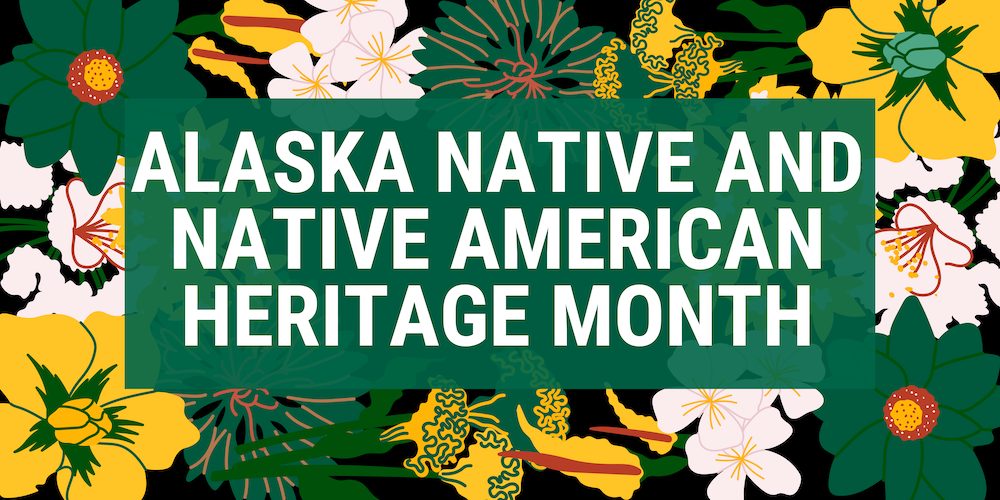
Alaska Native/Native American Heritage Month Events:
- Athabascan Fiddle Dance - Celebrating AK
- Thursday, Nov. 2, 5-8 p.m. Lucy Cuddy Hall - Cafeteria
- Noon Music featruing Ashley Young
- Wednesday, Nov. 8, 12-1 p.m. Student Union
- Native Student Services - Indigenous-Made Market
- Sunday, Nov. 12, 1-4 p.m. Rasmuson Hall
- BIPOC Karaoke- Hosted by Multicultural Student Services
- Wednesday, Nov. 15, 4-6 p.m. Student Union Den
- Writers as Detectives- Celebrating Research and Writing in Alaska Native History & Culture
- Wednesday, Nov. 15, 5:30-7:30 p.m. UAA/APU Consortium Library - Room 307
- Thursday, Nov. 16, 6-7:15 p.m. Social Science Building - Room 118
- Ethan/Kayaaní J Lauesen's “For your comfort”- Arc Gallery Exhibit- November 6, 2023-February 9, 2024
- The Arc Gallery will be hosting Ethan/Kayaaní J Lauesen's exhibition, "For Your Comfort." Ethan's heritage is Denaakk’e Koyukon Athabaskan, Ahtna Athabaskan, Tlingit (Sukteeneidi – Raven Dog Salmon Clan), and their work consists of prints, paintings, and drawings that focus on the cultural aspects of gender and LGBTQIA+ identity and how they are perceived in communities, specifically interior Alaska. Their work is a response to cultural perceptions of themselves, intersectional issues of race, gender, and sexuality.
-
Queer History Month (October 2023)
Happy Queer and LGBTQIA2S+ History Month!
As we enter the month of October, we are reminded of the significance of Queer History Month, a time dedicated to acknowledging the contributions, struggles, and triumphs of the LGBTQ+ community throughout history. It is an opportunity for our university community to reflect on our commitment to diversity, equity, and inclusion and to recognize the ongoing work needed to create a more just and inclusive campus environment.
Queer History Month serves as a reminder that LGBTQ+ individuals have made immense contributions to society, even in the face of discrimination and adversity. Their stories, often untold and marginalized, are an integral part of our shared history. By celebrating Queer History Month, we honor the bravery and resilience of those who have paved the way for progress and equality.
As a university community, we must acknowledge that our commitment to social justice extends beyond the recognition of these contributions. It requires us to actively support and advocate for the LGBTQ+ community, as well as all marginalized groups.
Please Join Multicultural Student Services, The Pride Center, and Student Activities as we celebrate this month through student-driven programs and recommendations.
- UAA Undergraduate in English, Aidan Jackson
What does Queer History Month mean to you?
“This month, and every month, is an opportunity to celebrate our intersectional identities as a part of the LGBTQ+ community and honor the sacrifices of our fierce predecessors as they advocated for an equitable and just society.”
Recommendations
The documentary “Disclosure” because it discusses the portrayal of transgender BIPOC [Black, Indigenous and other People of Color] in the film industry and how those depictions influence American culture.
The artist Ashnikko including the song, “Invitation ft. Kodie Shane” because she writes and performs songs that celebrate and challenge gender and sexual identities and constructs.
- UAA Doctoral Student in Clinical-Community Psychology, Riley Russell
What does Queer History Month mean to you?
“It's important to have space to observe and hold space for the history of queer events and activism to not forget, to celebrate, and to learn from. Especially given the cyclical nature and current resurgence of issues that have to be continually fought and defended.”
Recommendations
The book “Trans Bodies, Trans Selves: A Resource by and for Transgender Communities” by Laura Erickson-Schroth is informative and covers a lot of ground and there's a good level for everyone in it. This book is also by trans people and not just about trans people.
The movies “Paris is Burning” of course, and “How to Survive a Plague,” which is a documentary about AIDS activism that is very engaging and does a great job at making the viewer feel the context and informs about different styles of activism.

MSS + The Pride Center Recommend this engaging history collection by BlackPast, With Pride: Uplifting LGBTQ History On Blackpast • that focuses on highlighting the people of African descent who are also LGBTQIA2S+. We also recommend the incredibly moving film, “The Death and Life of Marsha P. Johnson.”
Know a UAA student who embodies the advocacy and legacy of Marsha P. Johnson? Nominate them for a scholarship here before October 15th.
Wanting to learn or refresh yourself on terminology and language around gender, gender expression, and sexuality? Check out the Pride Center’s Pronouns Matter Term Sheet.
Queer and LGBTQIA2S+ History Month! events and programs
Coming Out Day (and Inviting In!)
Wednesday, October 11th | Everywhere!
Want to celebrate coming out or inviting in? Here are graphics you can print and post in your workspace, home, or in the community!Four A’s Tabling at Pride Center
Thursday, October 12th | Pride Center
The Four A’s (Alaska Aids Assistance Association) Will be tabling at the Pride Center, please join our community partner to hear more about resources available to our community and current public health news.Queer History Month Film Viewing and Discussion
Wednesday, October 25th | 2-5 PM in the Multicultural Student Services Center
To recognize Queer History Month, we are coming together to watch a film about the people power and protests that inspired our now annual pride celebrations. We’ll share some Moose’s Tooth pizza while engaging in a discussion about queer history and how it can empower us to continue forward toward collective liberation.QT Halloween Homecoming
Friday, October 27th | 4-6 PM in the Student Union Den
Join the Pride Center & Rainbow Initiatives team for QT (Queer/Trans) Halloween Homecoming hosted by the spooky sultress, Penny Dragful with music by DJ Desert Rose!HallowQueer Carnival
Saturday, October 28th | 5-10:30 PM at The Nave
This community spooky celebration for queer youth and families is hosted by Identity. Tickets are sold here. - UAA Undergraduate in English, Aidan Jackson
-
Filipino American History Month (October 2023)
Dear Seawolves,
We hope you will join us in celebrating Filipino American History Month throughout the month of October. Let us remember the stories, legacies and incredible achievements of Filipino Americans this month and every month. From the pioneering labor activists of the Delano Grape Strike to the groundbreaking artists, scholars, and leaders who continue to shape our society today, Filipino Americans have left an indelible mark on America's history.
This year also marks the first year that the State of Alaska recognizes Filipino American History Month following the passage of HB 23, introduced by Rep. Genevieve Mina. Filipino American History Month bill passes the Alaska Legislature
Please join Kabayan Community, Multicultural Student Services, The Pride Center, and Student Activities as we celebrate this month through student-driven programs and recommendations.
- UAA Undergraduate in Nursing, Gerricka Cowan
What does Filipino American History mean to you?
“This month means the continuation of celebration and recognition of our Filipino people. Being Filipino is a big part of who I am and who surrounds me. A big part of our culture is sharing through food, hospitality, generosity, and celebration. This month will shine more light to the type of people we are. Whoever we encounter, we treat them as family and we care for them deeply.”Recommendations
- Songs by Zack Tabudlo including the song, “Give me your forever” and Yeng Constantino including, “Ikaw.”
- Influential Filipino people, including Heart Evangelista, Leas Salonga, Jose Rizal and Manny Pacquiao.
- Foods to try: Kare-Kare (Filipino stew with peanut sauce) and Taho (Sweet snack made with silken tofu and sago pearls).
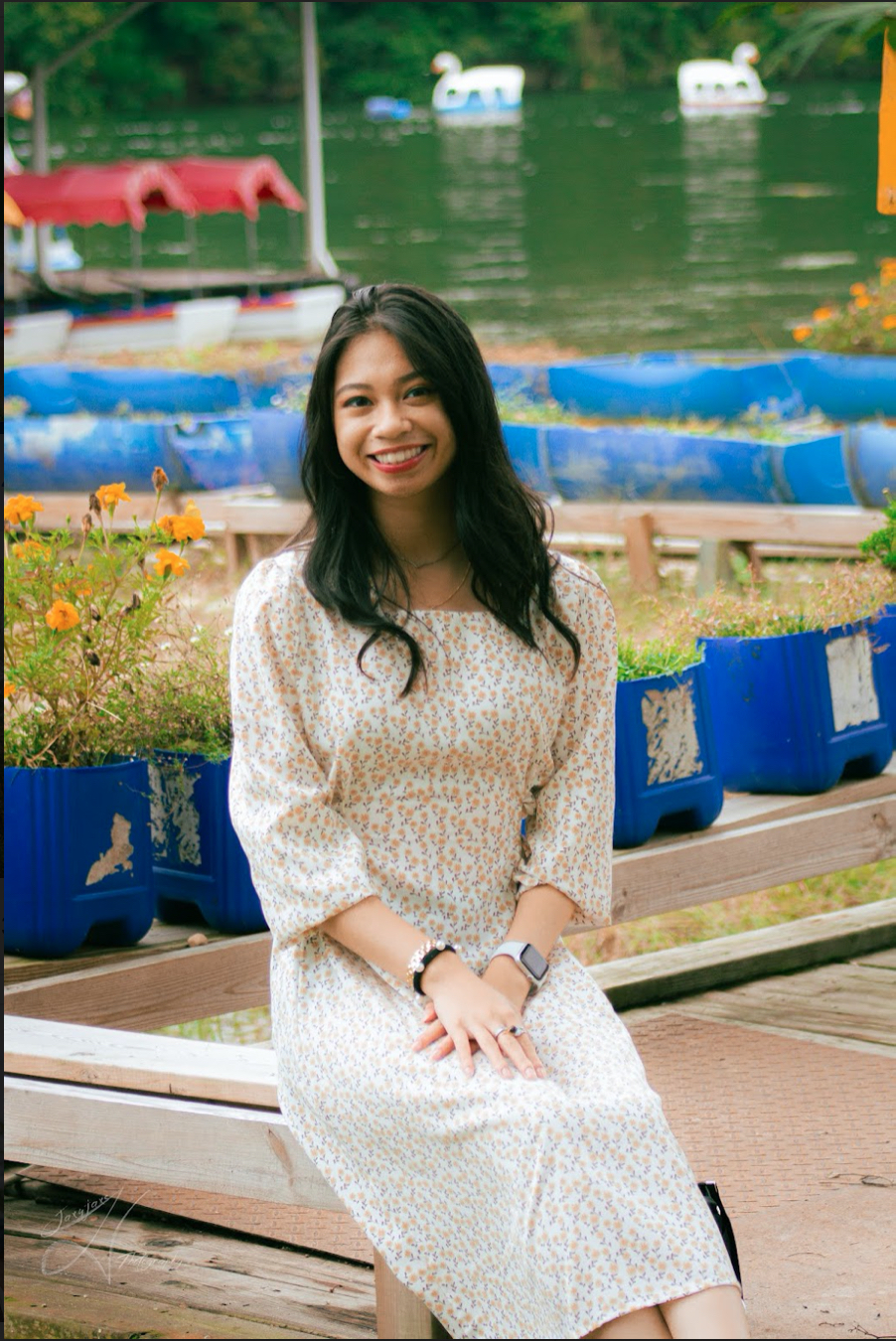
- UAA Undergraduate in Art, Charlize Sidro
One of my favorite songs is "Bagong Umaga" by Agsunta. The title translates to "New Morning," and it's a song very close to my heart as it reminds me of hope.
Laing is a Filipino dish of shredded or whole taro leaves with meat cooked in thick coconut milk. My mom cooked it all the time while I was growing up, but she could only get me to eat it by calling it the spinach from the cartoon, “Popeye,” so naturally it reminds me of my childhood.
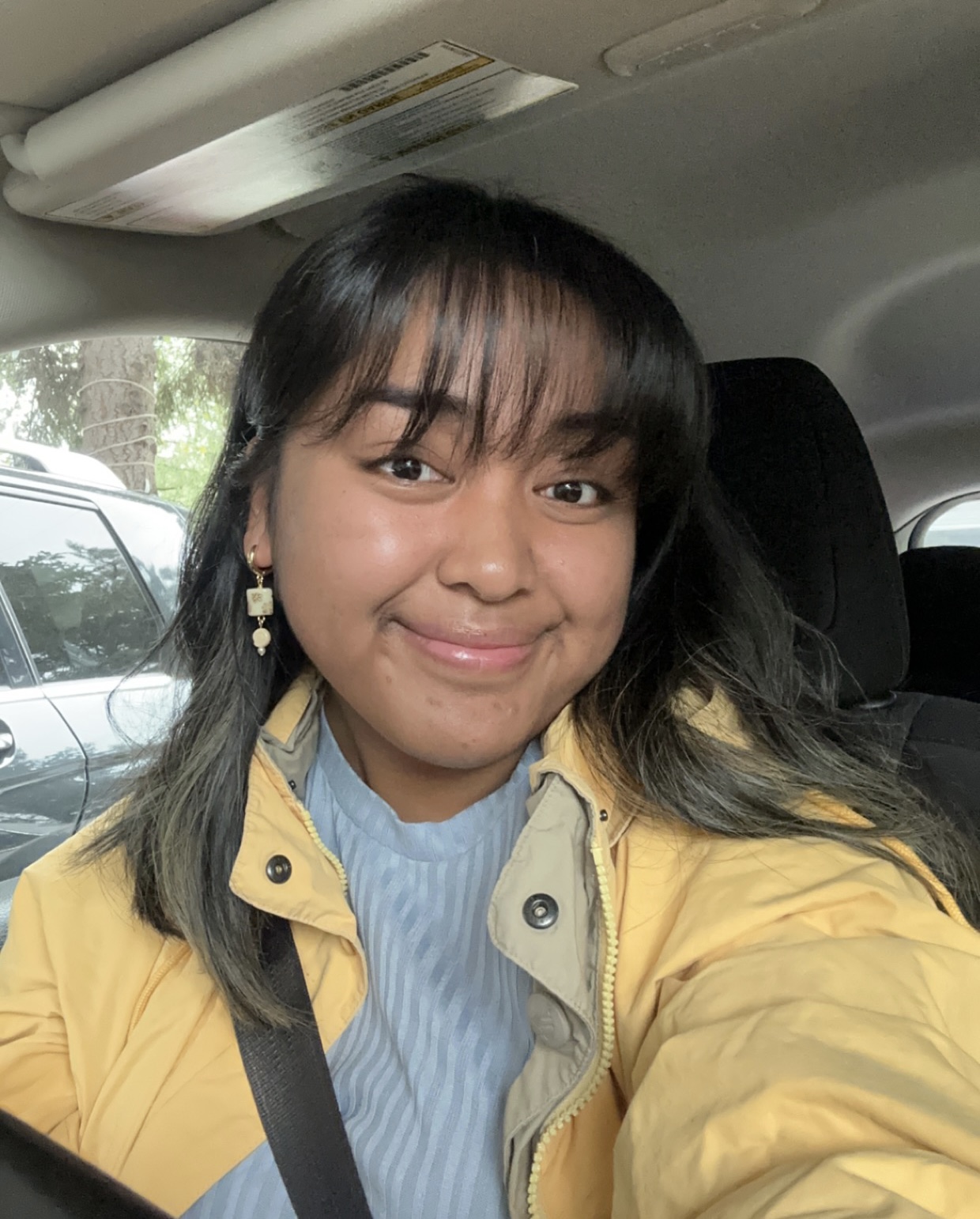
- UAA Undergraduate in Aviation Technology, Charliza Valdehueza
What does Filipino American History mean to you?
FAHM means recognition and validation of the roles my community played, and continues to play, in building the country we live in.Recommendations
- To anyone wanting to connect with the Philippines in any way, I really recommend listening to more Filipino artists. Music is such an easy way to add a little bit of Filipino Culture to your day. Here our a couple of my song recommendations:
- “Pagsamo” by Arthur Nery is one of my favorite songs at the moment, I am a bit biased though because the artist was born in the same city as my dad, Cagayan de Oro City.
- “Panalo” by Ez Mil is one of my my favorite hype songs, and it just so happens that the song is about being a proud Filipino!
MSS Recommends this Smithsonian Magazine article, “Why It Is Important to Know the Story of Filipino-American Larry Itliong” and Alaska Public Media’s “Hometown Alaska: Filipino history in Alaska runs deeper than you might expect” featuring UAA Professor, Dr. E.J. David.
UAA/APU Consortium Library Guide: Filipino American History Month
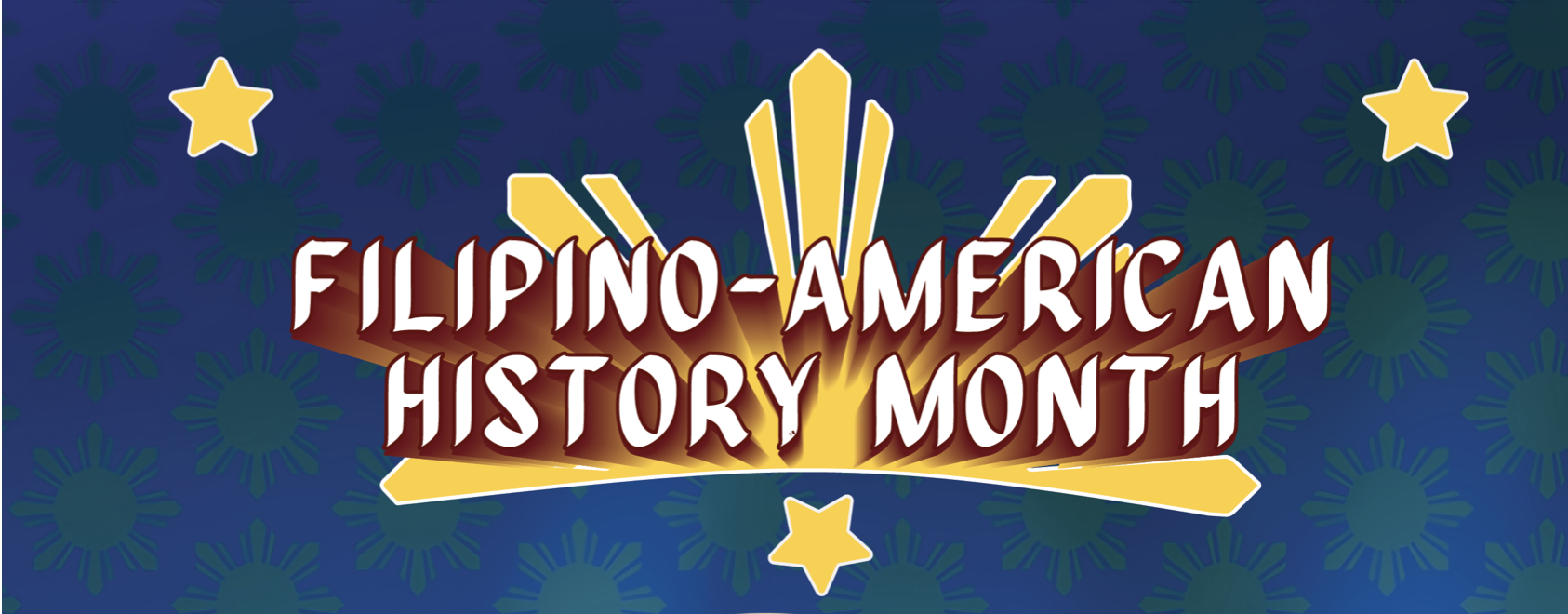
Filipino American History Month events and programs
FAHM Festival: Filipino American History Month Community Celebration
Thursday, October 19th | 12 - 5 PM in the Student Union DenJoin the Filipino American community of Anchorage as they gather in celebration of Filipino American History Month! In partnership with Fil-Am professors, staff, and leaders across Anchorage, this event is hosted by UAA Kabayan Community, the Filipino student organization on campus. We will be making halo halo, singing karaoke, enjoying Fil-Am vendors, and gathering with a Filipino meal.
BIPOC Karaoke Game Night: Filipino American History Month
Thursday, October 26 | 5 -7 PM in the Student Union DenUAA Multicultural Student Services is excited to host their monthly BIPOC Karaoke Game Night in celebration of Filipino American History Month. Join us for an evening of karaoke, Filipino food, community, games, giveaways, and fun! BIPOC stands for Black, Indigenous, and People of Color. MSS works to center BIPOC identities at this event and is committed to uplifting BIPOC and marginalized communities through community, connection, and play.
MANA: The History We Inherit
Saturday, October 28 | 11 AM - 1 PM Special Programming | 10 AM - 6 PM Free Admission
Anchorage Museum
Education Hall, Main Floor, East WingMana (ma•nuh) means “to inherit, receive as an inheritance or to take after.” On October 28, enjoy free admission at the Anchorage Museum for the opening of the Mana exhibit. The pop-up exhibition will feature oral and visual stories of Filipino elders in Alaska, a group that settled in the state in the late 18th century. The special programming will include music, food, vendors, guest speakers, and prizes. Check out manaalaska.com for more information!
Kabayan Community Friendsgiving
Monday, November 20 | 6 - 8 PM
Student Union DenWe encourage the celebration of Filipino culture, history, and identities throughout the year! Kabayan Community invites UAA students, staff, and faculty to attend a potluck celebration in November before we depart for the fall holiday. Feel free to bring a dish and/or a friend!
- UAA Undergraduate in Nursing, Gerricka Cowan
-
Latine & Hispanic Heritage Month
Saludos to our University Community,
We are excited to step into a month of profound significance, Latine Heritage Month (also known as Latinx/a/o or Hispanic Heritage Month).This month, we come together to honor the rich tapestry of cultures, histories and contributions that have shaped Latine/a/o/x and Hispanic American communities. This is not just a month of recognition but an opportunity to foster unity, understanding and appreciation. While Latine and Hispanic Heritage Month is observed annually throughout the United States from Sept. 15-Oct. 15, we honor and celebrate Latine and Hispanic American communities far beyond this designated month.
Please join Multicultural Student Services (MSS) and Student Activities as we celebrate this month through student-driven programs and recommendations.
UAA undergraduate student Brian Cuevas Fuentes recommends:
- Mexican actor, director and comedian Eugenio Derbez. Euegenio’s Mexican sitcom “La Familia P. Luche” reminds Brian of home, family, and laughter.
- Colombian musician Juanes inspired Brian to learn to play the guitar. He recommends the song, “La Camisa Negra.”
UAA undergraduate student Sulynnette Vega Ledesma recommends:
- The song “Preciosa” by Marc Anthony because it reminds her of the incredible natural beauty of Puerto Rico.
- The film “Spanglish,” starring Paz Vega. Sulynnette shares that this film is an important depiction of working-class immigrants in the United States and how it can feel to be surrounded by another language.
MSS recommends the Smithsonian Latino Museum’s interactive online gallery, Nuestra América: 30 Inspiring Latinas/Latinos Who Have Shaped the United States.
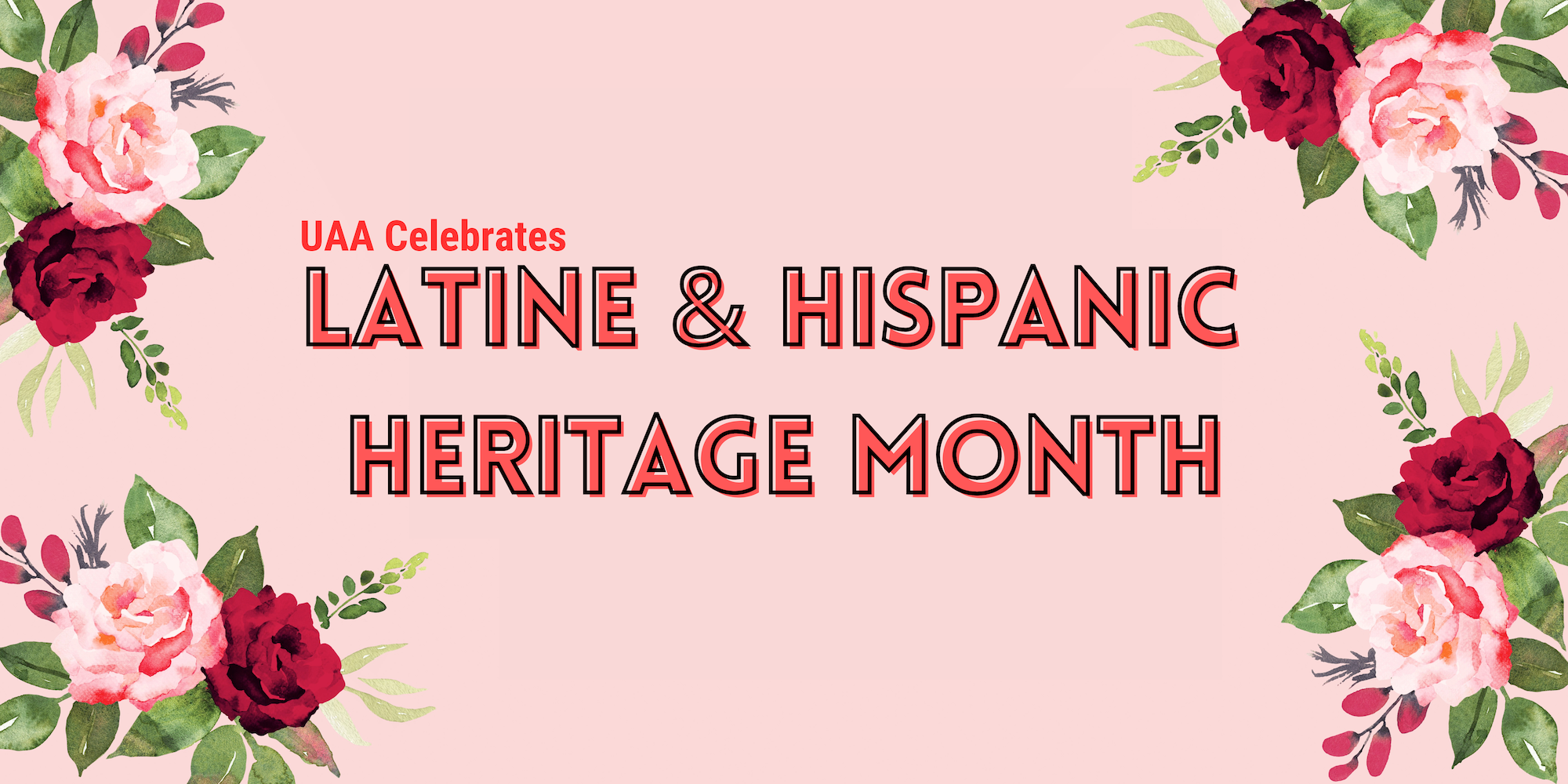
Latine & Hispanic Heritage Month events and programs
BIPOC Karaoke Game Nite: Celebrating Latine and Hispanic Heritage
Wednesday Sept. 27, 5-7 p.m. in the Student Union Den
Serrano's Mexican Grill Food Truck
UAA Students can get a free meal with drink with their Wolfcard. Food will be for sale for UAA staff & faculty.
Thursday, Sept. 28, 11:00 a.m. to 1:00 p.m.International Student Organization celebrates Mexican Independence Day
Thursday, Sept. 28, noon-2 p.m. in the Student Union -
PRIDE Month (June)
At UAA, valuing diversity is integral to excellence. Diversity maximizes our potential for creativity, innovation, educational excellence, and outstanding service to our communities.
We honor diverse experiences and perspectives—including differences in sex, gender identity, gender expression and sexual orientation—and strive to create welcoming and inclusive learning environments where all are treated with respect.
PRIDE refers to a celebration of all things lesbian, gay, bisexual, transgender (LGBT), as well as two-spirit, asexual, intersex, non-binary, queer and beyond (2S+)! This includes LGBT2S+ history, music, fashion, celebrities, entertainment, culture and civil rights movements. PRIDE events are usually celebrated in June to celebrate the Stonewall riots in June 1969, when patrons of a New York gay bar protested and fought for their right to peacefully congregate.
You can learn more about the history of Pride movements at the History Channel website.
At UAA, we celebrate our community with PRIDE everyday! We are proud to have opened Alaska's first ever Pride Center here at UAA this Janurary. We are also supporting students through the student organization The Family, employee pro-social groups, history (October) and pride (June) month events, preferred name/gender pronoun selection in Banner, gender neutral restrooms, an LGBTQIA2S+ Advisory Committee, and gender-neutral student housing.PRIDE Month Events

June 14 | 4:30pm | Pride Center & Student Union Plaza | Sunshine & Sandwiches Pride Party!Come celebrate pride at UAA's annual party! We'll discuss historical moments in queer history as we move together around campus and reflect on informative signs made by The Family (1 mile route). Then, we'll enjoy the company of Community Partners, Sandwiches, Wild Scoops ice cream, the musical talent of The Manladyladyman band, art making and a dance party with KRUA DJs!

June 30 | 4:00pm | Pride Center | Pride Art 2023!Come celebrate Pride Month in community. We'll be painting and crafting outdoors! All art supplies, beverages and snacks provided. This is event is open to all members of our community. RSVP encouraged, not required.
-
Previous Celebrations
- 2022-2023 Academic Year
-
APIDA Appreciation Month
UAA is proud to celebrate Asian American, Pacific Islander, Desi American (APIDA) Appreciation Month in April. While May is officially designated as APIDA Heritage Month, we are hosting some celebrations while students are still in calss. During this time, communities around the country celebrate the histories and contributions of Asian Americans and Americans from the Pacific Islands. These communities represent vastly diverse ethnicities, cultures, languages and histories in the United States.
The first Asians recorded in the US, on the West Coast in 1587, were from the Philippines. This was followed by Indians (East Asian, not Native American) at Jamestown, and the Chinese and Japanese in Hawaii at the turn of the 19th century. At the end of the 1800’s, people from Korea, Guam, Samoa and Vietnam all came to mainland US as well.
Much like in recent news, nationalist treatment of APIDA communities have long been frought with discrimination. The Chinese Exclusion Act, Japanese Internment during WWII, the colonization of Hawaii, Samoa and Guam, have caused great harm to these communities. Despite these atrocities, AAPI communities have made massive contributions to the success of the US in science, civil rights, technology, medicine and more.APIDA Appreciation Month
April 5 | 12:00pm | Student Union | Noon Music with Katie Scoggin
April 12 | 11:30am-1:30pm | Student Union Cafeteria | Anchorage Public Library Pop Up
April 14 | 1:00pm-2:30pm | Student Union Cafetria | Plants & Snacks
April 14 | 4:00pm | Multicultural Student Services (RH 106) | Being APID
An affinity space for APIDA identifying people to connect and share experiences.
April 18 | 4:00pm | Student Union Den | BIPOC Karaoke Game Night: APIDA
April 25 | 12:00pm-2:00pm | Student Union Seawolf Grounds | APIDA Drink Social -
Women's History Month (March)
Women’s History Month celebrates the unique contributions of women to American history. Women’s history month started as a week of celebration by a school district in California in 1978. The event grew until lobbyists convinced President Carter to declare a national week of celebration in 1980. In 1987, Congress declared March Women’s History Month.
Some major contributors to Women’s history include Susan B. Anthony, Sojourner Truth, Rosa Parks, Gloria Steinem, bell hooks, and so many more. Check out the amazing women’s history timeline from the History Channel to learn more about American women leaders throughout the decades. Alaska has also been a contributor to American women’s history through the work of many indigenous women trailblazers. Learn more (Not Available) about the contributions of Agnes Brown, Katie John, Elizabeth Peratrovich, Alberta Schneck Adams, and Clara Swan.
*Women's History Month celebrates those who identify as women, femme, trans, and non binary.
Women's History Month Events
March 8 | 12:00pm | Student Union | Noon Music with Rosie Rush
March 8 | 8:00pm | Bear Tooth Theatrepub | TÁR Film Screening
March 21 | 3:00pm | Online | Writers Series: MoHagani Magnetek
March 22 | 5:00pm | Student Union Den | Local Women in Politics Panel
March 23 | 4:00pm | Multicultural Student Services (RH 106) | Being Femme
An affinity space for womxn and femme identifying people to connect and share experiences.
March 28 | 3:00pm | Online | Writers Series: Laura Carpenter
March 29 | 4:00pm | Student Union Den | BIPOC Karaoke Game Night: Women of Color
March 30 | 7:30pm | UAA/APU Consortium Library | Alaska Chapter of the American Civil Liberties Union (ACLU): Equality, Liberty, and Justice For AllVisit the UAA/APU Consortium Library Guide for Women's History Month
-
Black History Month (February 2023)
Black History Month started out in the United States in the ‘20s as a week that celebrated the birthdays of Abraham Lincoln and Frederick Douglass. Black History Month (BHM) was first celebrated as a full month in 1970 at Kent State University in Ohio. The month was recognized by the President Gerald Ford in 1976.
Since then, Black History Month, sometimes referred to as African-American History Month, celebrations have included information on important historical events as well as leaders in African-American history such as Frederick Douglass, Harriet Tubman, Martin Luther King Jr., Malcolm X, Rosa Parks, James Baldwin and more.
In 2016, the U.S. opened the National Museum of African American History and Culture. It is the only national museum devoted exclusively to the documentation of African American life, history, and culture. You can explore the vast history of African Americans and attend virtual BHM events by checking out the museum’s extensive website.
In Alaska, African Americans have been a part of all aspects of development of the state going back almost two hundred years. This includes whaling, the military, engineering, building, and more. In 2020, UAA History professor Dr. Ian Hartman published Black History in the Last Frontier highlighting the achievements and contributions of Alaska’s Black community, while demonstrating how these women and men have endured racism, fought injustice, and made a life and home for themselves in the forty-ninth state. The book is available free for download from the National Park Service.
Learn more about Black History Month online at blackhisotrymonth.gov and asalh.org.
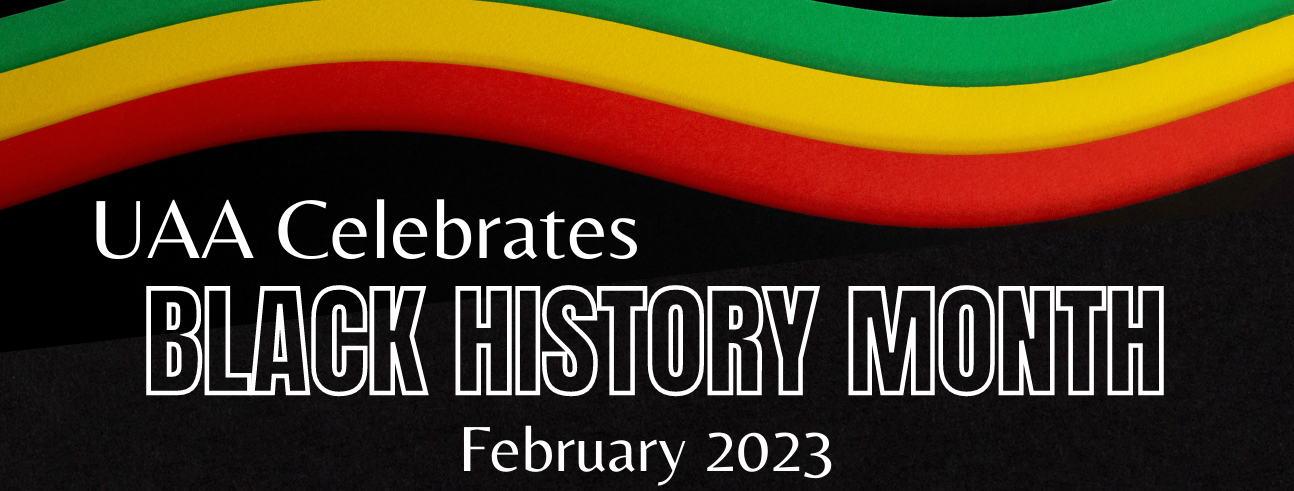
Black History Month Events
February 2 | 7:00pm | Williamson Auditorium | MLK Student Appreciation Event
February 4 | 1:00pm - 5:00pm | Anchorage Museum | 8th Annual Alaska Black Business Expo & Summit
February 15 | 6:00pm | Student Union Den | Blues Night
February 16 | 7:00pm | Arts 150 | Film Screening: Judas and the Black Messiah
February 18 | 10:00am - 5:00pm | Bettye Davis East Anchorage High School | Bettye Davis African-American Health & Equity Summit
February 21 | 4:00pm | UAA Multicultural Student Services (RH 106) | Being Black
Being Black is an affinity event for students, staff, and facult who identify as Black to connect and share with one another. Refreshments available! You can register here.February 28 | 4:00PM | Student Union Den | BIPOC Karaoke Game Night: Black History Month
Visit the UAA/APU Consortium Library Guide | Black History Month 2023
-
Alaska Native/Native American Heritage Month (November)
UAA is proud to celebrate Alaska Native/Native American Heritage Month. In 1990, George H.W. Bush declared November to be Native American Heritage Month. It is now more commonly referred to as American Indian and Alaska Native Heritage Month. It is a time to celebrate the rich and diverse American Indian and Alaska Native histories and heritage, as well as educate ourselves about the historical and lived experiences of indigenous peoples who live(d) on the lands which became the United States.
For more information on the diverse experiences and cultures of American Indians/Alaska Natives check out these resources:
National Congress of American Indians
Alaska Native Heritage Center
Native Movement
National Museum of the American Indian
Alaska Native Knowledge NetworkAs always, when you are celebrating a culture that differs from your own, be sensitive to avoiding stereotypes about that culture. It is important to be aware of the difference between cultural appropriation and cultural appreciation so that we are honoring and respecting other people’s values, beliefs, and norms.
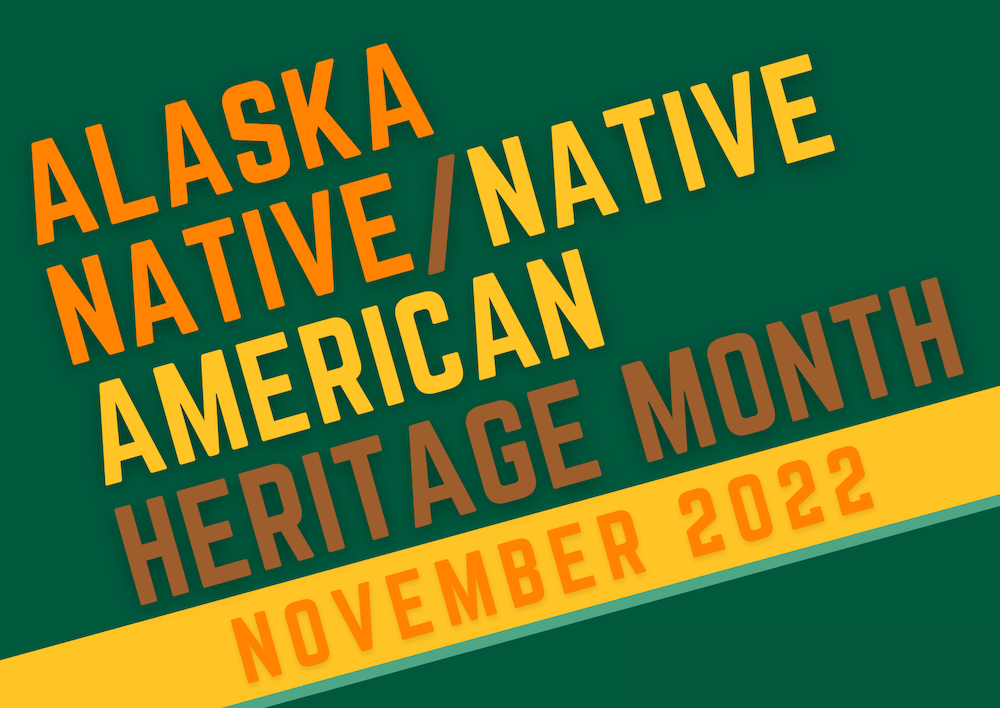
Alaska Native/Native American Heritage Month Events
November 4 | 5:30pm | Anchorage Museum Visit - For Residence Life Students Only
November 7 | 6:00pm | Cama-i Room | Guest Speaker: Skoey Vergen
November 9 | 6:00pm | Student Union Den | Connection Through Expression: Music and Poetry Night
November 14 | All Week | Instagram | Sustainablity in living: AK Native Communities
November 21 | 4:00pm | Cama-i Room | Being IndigenousSponsors: Student Life and Leadership, Student Activities, Cama-i Room, Residence Life
-
Queer History Month (October 2022)
UAA and the YouAA Committee is proud to celebrate and honor our Queer and Trans Community as a part of the Queer History Month. In 1994, a coalition of education-based organizations in the United States designated October as LGBTQ2S+ History Month. In 1995, a resolution passed by the General Assembly of the National Education Association included LGBTQ2S+ History Month within a list of commemorative months (Library of Congress).
It was first observed in 1994. October was selected because it coincides with National Coming Out Day on October 11, and because it is the month of the first March on Washington for Lesbian and Gay Rights in 1979. More recently, in October 2010, Spirit Day was established in response to a string of high-profile teen suicides that year.
Queer History Month specifically honors and remembers the history and movement of folks from the Lesbian, Gay, Bisexual, Transgender, Questioning and Two-Spirit community. The month is celebrated in recognition of the history of LGBTQ2S+ civil movements and to demonstrate support and solidarity with the LGBTQ2S+ community. Information is available about the timeline and specific milestones in LGBTQ2S+ civil rights.
According to GLAAD, “during the early years, the celebration was largely marked by a call to action and commemoration. But since then, LGBT History Month has blossomed into a national coordinated effort to highlight exemplary role models from the LGBT community. Since 2006, this push has so far been led by LGBT rights and education organization Equality Forum.”
*insert resource list for students in the queer community*
Celebrate Queer History Month with UAA:
Social Media Campaigns:
October Icons | All Month | uaamcc
Identity Flags | All Month | uaamcc
UAA Life Takeover | Tuesday, October 11 | uaalife
Awareness Campaign | October 10 - October 11
Follow along through flyers and social media (and get access to google drive) with resources on History of Coming Out, Inviting IN + Coming OUT, and Affirmation for our community, how to respond as good ally.
Rainbow Social | Wednesday, October 12 | 3:00 PM - 5:00 PM | RH 106
Social connection groups for the LGBTQ+ community.
Crafternoons | Friday, October 14 | 12:30 PM - 3:30 PM | RH 106
Pride flag expression session.
QT Halloween Homecoming Social | Friday, October 28 | 6:30 PM - 9:00 PM | RH 106
Join QT: Queer and Trans, and The Family Club, in celebrating QT Homecoming. Costume contests, giveaways, squishmallows, and temporary tats!
Rocky Horror Picture Show Interactive Screening | Monday, October 31 | 4:00 PM - 6:00 PM | SU Den
-
Filipino American History Month (October 2022)
UAA and the YouAA Committee is proud to celebrate and honor our Filipino American Community here at UAA and in Anchorage. October is Filipino American History Month or FAHM, celebrated annually in October, commemorating the arrival of the first Filipinos in modern-day Morro Bay, California in the United States on October 18, 1587.
The year 2022 marks several anniversaries in Filipino American history.
First, 50 years ago, the first Filipino American Studies (FAS) classes were taught at UCLA and UC Davis. With classes previously established at San Francisco State University and City College of San Francisco, 1972 was the year in which FAS began to be taught across multiple institutions and states (with FAS classes being established at Western Washington University and the University of Hawai’i in the mid-1970s). Over the past 50 years, college-level FAS classes became instituted at colleges and universities all over the country – from Oregon to Michigan to Virginia. More recently, FAS curricula have been established in K-12 public schools in California, Hawai’i, and Seattle. FAS scholars have also emerged across multiple disciplines – from History to Humanities to Psychology to Education – with numerous books, journal articles, and multimedia works that provide knowledge of the experiences of Filipino Americans in the United States.
Second, in 1982, Dorothy Laigo Cordova founded the Filipino American National Historical Society (FANHS) – the oldest national Filipino American organization and the only national group committed to promoting and preserving Filipino American history. For the past 40 years, FANHS has educated Filipino and non-Filipino people – through conferences, workshops, lectures, films, artwork, and other media – about the Filipino American historical experiences and contributions to the U.S.
Finally, October 1992 was the first time that Filipino American History Month (FAHM) was celebrated in the United States – a year after FANHS passed a proclamation (spearheaded by Fred Cordova). Since then, FAHM has been celebrated annually all over the country – with initiatives by FANHS chapters, local community nonprofit groups, government organizations, and college student organizations. In 2009, U.S. Congress declared October as FAHM, and in 2015, President Obama celebrated the first FAHM at the White House.
Filipino Americans have a history going back over 200 years of living in Alaska. Called “Alaskeros” they were instrumental in working the canning industry and helping unionize cannery workers. Filipino Americans make up one of the largest ethnic groups in Alaska today. For more information about the Filipino American experience, watch A Filipino American Story Since 1587 (7 minutes). For a modern and uniquely Alaskan perspective, read We Have Not Stopped Trembling Yet by UAA professor EJR David, PhD (available in text and e-text at the UAA Consortium Library).
UAA Students who identify as Filipino are welcome to join Filipino Student Association - Interest Meeting: Tuesday, October 4 | 4:30-5:30 PM (Zoom)
A very Happy Filipino American History Month! As always, when you are celebrating a culture that differs from your own, be sensitive and respectful. It is important to be aware of the difference between cultural appropriation and cultural appreciation, so that we are not disrespecting other people’s values, beliefs and norms.

Join UAA in celebrating Filipino American History Month:
Mabuhay Seawolves! - Social Media Campaign: All Month starting October 1 https://forms.gle/QMPinRwUv2NZ3Ygr5
Filipino American History Month Community Celebration | Saturday, October 1 | 11:00 AM - 3:00 PM | ARTS 150
Hosted by Alaskero Partnership Organizers, Fil-Am UAA staff/faculty, and Filipino organizations in Anchorage - Dr. Gabriel Garcia, Dr. E.J. David, and Dr. Joy Mapaye
Free food, entertainment, and education!
EVERYONE is welcome! All ages are encouraged to attend.Filipino Student Association - Interest Meeting | Tuesday, October 4 | 4:30-5:30 PM (Zoom)
Fil-Am Karaoke Night: Thursday, October 20 | 6:00 - 8:00 PM | SU DenFilipino food from Bahay Kubo will be served!
Being Filipino/Pinoy: Monday, October 24 | 4:30 - 6:00 PM | MSS, RH 106
Affinity space for students, staff, and faculty with shared identities to connect and discuss their lived experiences.
Please contact qmcuaresma@alaska.edu for more info.
-
Latine/Hispanic Heritage Month (September 15 - October 15)
UAA and the YouAA Committee is proud to celebrate and honor our Latine/Hispanic Community through Latine/Hispanic Heritage Month September 15 - October 15. National Latine/Hispanic Heritage Month celebrates and recognize the achievements and contributions of Hispanic American champions who have inspired others to achieve success. Through our programming efforts and celebrations we hope to celebrate the histories, cultures and contributions of American citizens whose ancestors came from Spain, Mexico, the Caribbean and Central and South America.
The observation started in 1968 as Hispanic Heritage Week under President Lyndon Johnson and was expanded by President Ronald Reagan in 1988 to cover a 30-day period starting on September 15 and ending on October 15. It was enacted into law on August 17, 1988, on the approval of Public Law 100-402.
The day of September 15 is significant because it is the anniversary of independence for Latin American countries Costa Rica, El Salvador, Guatemala, Honduras and Nicaragua. In addition, Mexico and Chile celebrate their independence days on September 16 and September 18, respectively. Also, Día de la Raza, which is October 12, falls within this 30 day period.
The word Hispanic, first coined by the Census Bureau as a means of categorization, refers to those who come from Spanish speaking countries. Latino/Latina (Latine in gender expansive form) refers to those who come from countries in Latin America. While there is great overlap, not all Latin Americans speak Spanish and not all Hispanics are Latin American. The term Latine also acknowledges the indigenous populations of Latin America who speak over 560 unique languages.
As always, when you are celebrating a culture that differs from your own, be sensitive and respectful. t is important to be aware of the difference between cultural appropriation and cultural appreciation, so that we are not disrespecting other people’s values, beliefs and norms.
Happy Latine/Hispanic Heritage Month to our UAA Community!
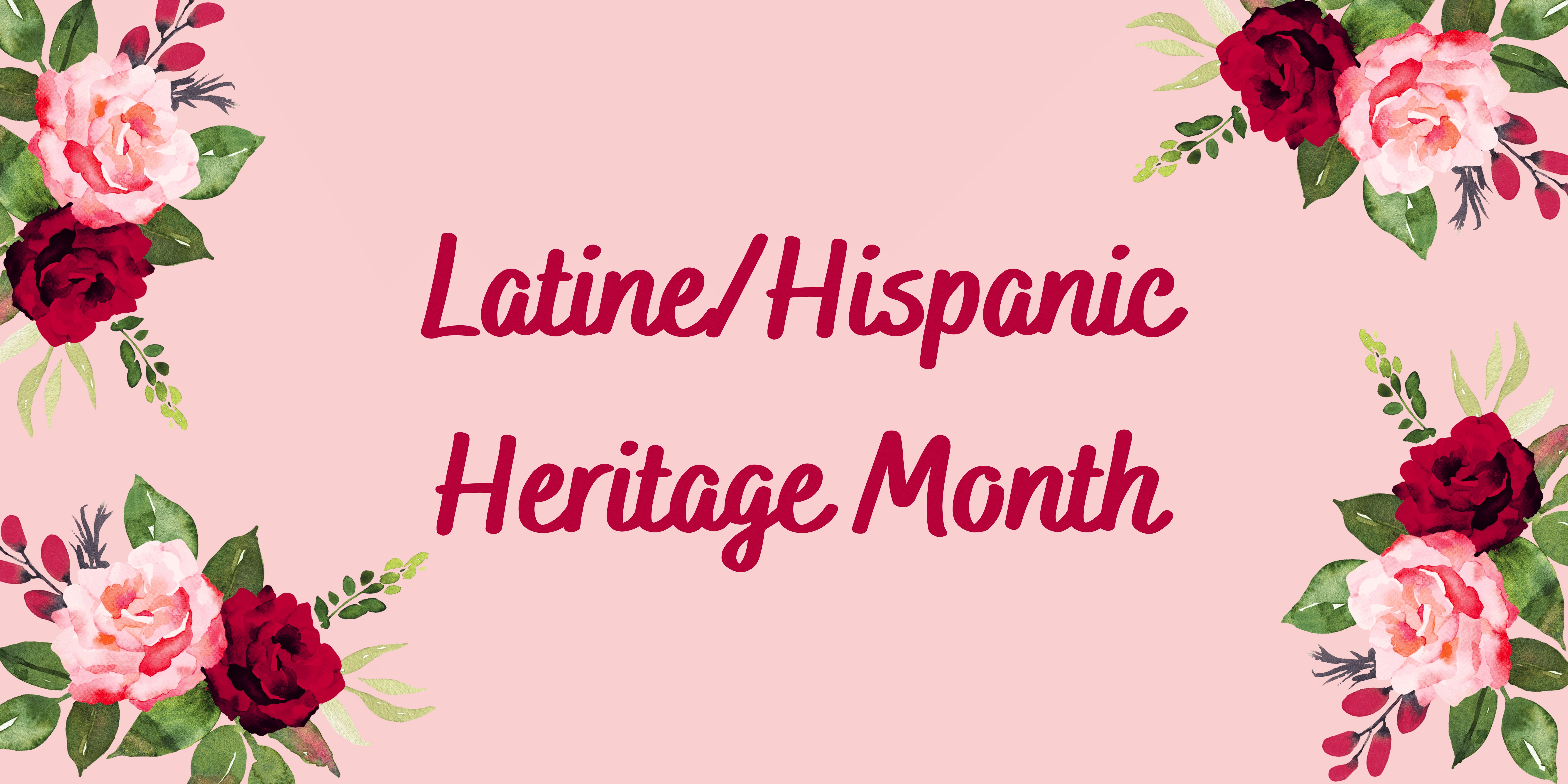
Latine/Hispanic Heritage Month Events
Being Latine/Hispanic | September 29, 2022 | 1:00 PM Cafecito Bonito
Mexican Independence Day Celebration | September 14, 2022 | 6:00 PM MSS RH 108
Latine Student Leaders on UAA Life | September 26, 2022 Follow uaa_student_activities
No Big Heads with Indra Ariaga | October 5, 2022 | 7:00 PM
UAA at The Movies: Selena | October 4, 2022 | 7:00 PM Century 16 Theatre
Please contact cgupta@alaska.edu for more info.
-
Pride Month (June)
At UAA, valuing diversity is integral to excellence. Diversity maximizes our potential for creativity, innovation, educational excellence, and outstanding service to our communities.
We honor diverse experiences and perspectives—including differences in sex, gender identity, gender expression and sexual orientation—and strive to create welcoming and inclusive learning environments where all are treated with respect.
PRIDE refers to a celebration of all things lesbian, gay, bisexual, transgender (LGBT), as well as two-spirit, asexual, intersex, non-binary, queer and beyond (2S+)! This includes LGBT2S+ history, music, fashion, celebrities, entertainment, culture and civil rights movements. PRIDE events are usually celebrated in June to celebrate the Stonewall riots in June 1969, when patrons of a New York gay bar protested and fought for their right to peacefully congregate.
You can learn more about the history of Pride movements at the History Channel website.
At UAA, we celebrate our community with PRIDE everyday! This includes supporting students through the student organization The Family, employee pro-social groups, history (October) and pride (June) month events, preferred name/gender pronoun selection in Banner, gender neutral restrooms, an LGBTQIA2S+ Advisory Committee, and gender-neutral student housing.
Pride Month Events
June 15 | 5:30pm | Student Union Plaza | Sunshine and Sandwiches Walk
June 22 | 11:30am | Virtual | Lavender Leaders Panel
Coming Soon | Being QTBIPOC
June 30 | 4:00pm| Location to be announced | MSS Community Art ProjectSponsors: Student Life and Leadership, Student Activities, Multicultural Student Services, UAA Concert Board, Chief Diversity Officer, UAA/APU Consortium Library.
-
APIDA Heritage Month (May)
UAA is proud to celebrate Asian American, Pacific Islander, Desi American (APIDA) Heritage Month. May was officially designated as APIDA Heritage Month in 1992. During this time, communities around the country celebrate the histories and contributions of Asian Americans and Americans from the Pacific Islands. These communities represent vastly diverse ethnicities, cultures, languages and histories in the United States.
The first Asians recorded in the US, on the West Coast in 1587, were from the Philippines. This was followed by Indians (East Asian, not Native American) at Jamestown, and the Chinese and Japanese in Hawaii at the turn of the 19th century. At the end of the 1800’s, people from Korea, Guam, Samoa and Vietnam all came to mainland US as well.
Much like in recent news, nationalist treatment of APIDA communities have long been frought with discrimination. The Chinese Exclusion Act, Japanese Internment during WWII, the colonization of Hawaii, Samoa and Guam, have caused great harm to these communities. Despite these atrocities, AAPI communities have made massive contributions to the success of the US in science, civil rights, technology, medicine and more. -
Diversity Month (April)
Program: Stand Against Racism Challenge (YWCA)
Virtual learning tool designed to create dedicated time and space to build more effective social justice habits, particularly those dealing with issues of race, power, privilege, and leadership. Participants will have the opportunity to log on to the challenge via phone app or by visiting the challenge website and are presented with challenges such as reading an article, listening to a podcast, reflecting on personal experience, and more!
Register here
Program: Shared Equity Leadership Program Introduction
Join the Chief Diversity Officer for a discussion about an exciting new leadership development program called the Shared Equity Leadership Seminar. Shared Equity Leadership is a model of equity promotion endorsed by the American Council of Education (ACE), and our accreditor, NWCCU. The model includes a.) examination of one’s personal journey, b.) an examination of values and c.) practices integral to equity work. Faculty and staff can earn a Shared Equity Leadership Certificate beginning Fall 2022. Come learn about this program!Monday April 4, 2022 10-1030 am OR
Tuesday April 12. 2022 3-30 pm
-
APIDA Appreciation Month
- 2021-2022 Academic Year
-
Women's History Month (March)
Women’s History Month celebrates the unique contributions of women to American history. Women’s history month started as a week of celebration by a school district in California in 1978. The event grew until lobbyists convinced President Carter to declare a national week of celebration in 1980. In 1987, Congress declared March Women’s History Month.
Some major contributors to Women’s history include Susan B. Anthony, Sojourner Truth, Rosa Parks, Gloria Steinem, bell hooks, and so many more. Check out the amazing women’s history timeline from the History Channel to learn more about American women leaders throughout the decades. Alaska has also been a contributor to American women’s history through the work of many indigenous women trailblazers. Learn more (Not Available) about the contributions of Agnes Brown, Katie John, Elizabeth Peratrovich, Alberta Schneck Adams, and Clara Swan.
*Women's History Month celebrates those who identify as women, femme, trans, and non binary.

-
Black History Month (February)
Black History Month started out in the United States in the ‘20s as a week that celebrated the birthdays of Abraham Lincoln and Frederick Douglass. Black History Month (BHM) was first celebrated as a full month in 1970 at Kent State University in Ohio. The month was recognized by the President of the United States in 1976.
Since then, Black History Month, sometimes referred to as African-American History Month, celebrations have included information on important historical events as well as leaders in African-American history such as Frederick Douglass, Harriet Tubman, Martin Luther King Jr., Malcolm X, Rosa Parks, James Baldwin and more.
In 2016, the U.S. opened the National Museum of African American History and Culture. It is the only national museum devoted exclusively to the documentation of African American life, history, and culture. You can explore the vast history of African Americans and attend virtual BHM events by checking out the museum’s extensive website.
In Alaska, African Americans have been a part of all aspects of development of the state going back almost two hundred years. This includes whaling, the military, engineering, building, and more. In 2020, UAA History professor Dr. Ian Hartman published Black History in the Last Frontier highlighting the achievements and contributions of Alaska’s Black community, while demonstrating how these women and men have endured racism, fought injustice, and made a life and home for themselves in the forty-ninth state. The book is available free for download from the National Park Service.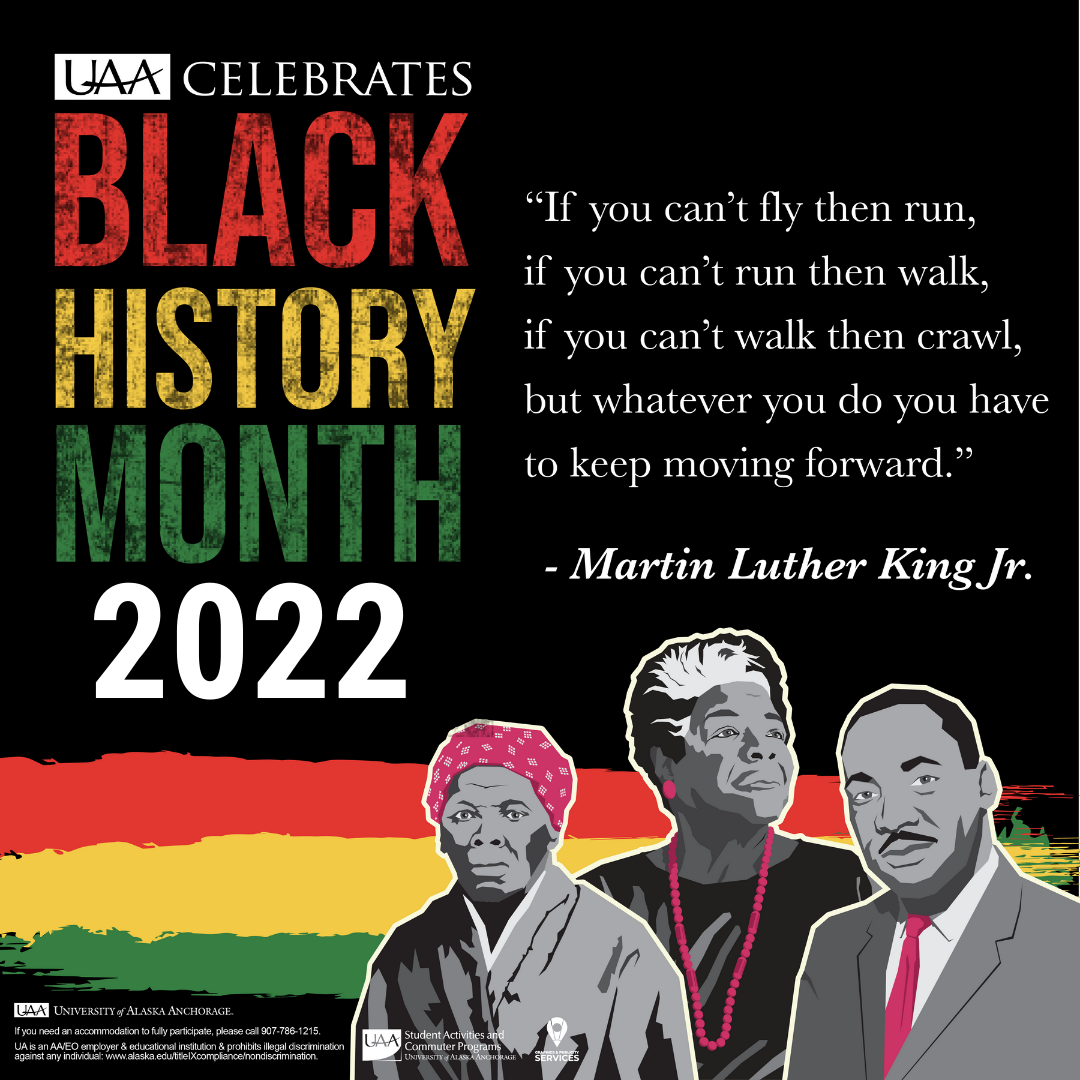
Black History Month EventsFeb. 4 | 11:30am | Virtual | Chancellor's MLK Student Appreciation Celebration
Feb. 5 | 12pm | Anchorage Museum Theater | Colorism
Feb. 11 | All Day | Free cupcakes at Eva's Cupcakery
Feb. 16 | 1:00pm | Virtual | "For the Rights of All: Ending Jim Crow in Alaska" Screening & Discussion
Feb. 17 | 7:00pm | Cinemark 16 | UAA at the Movies: The Harder They Fall (Black History Month Film)
Feb. 18 | All Day | Free popcorn at Jazzy Gourmet Popcorn
Feb. 23 | 5:00pm | Virtual | Conversation Café: The Politics of Being BIPOC at Work
Feb. 25 | 7:00pm | Student Union Den | Free Karaoke & Comedian: Alex BabbitUAA / APU Consortium Library | Black History Month
Student Life and Leadership, Multicultural Student Services, Student Activities, Black Student Union, UAA/APU Consortium Library.
-
Alaska Native/Native American Heritage Month (November)
UAA is proud to celebrate Alaska Native/Native American Heritage Month. In 1990, George H.W. Bush declared November to be Native American Heritage Month. It is now more commonly referred to as American Indian and Alaska Native Heritage Month. It is a time to celebrate the rich and diverse American Indian and Alaska Native histories and heritage, as well as educate ourselves about the historical and lived experiences of indigenous peoples who live(d) on the lands which became the United States.
There are five-hundred seventy-four (574) federally recognized American Indian and Alaska Native groups. Two-hundred and twenty-nine (229) of these groups are in Alaska. There are also hundreds of groups without federal recognition, who may have state recognition or no recognition at all.
In the lower 48, tribal nations are represented in 35 states across 334 recognized reservations. The current location of these sovereign nations and their lands is based on 500 years of colonization, removal, government treaties, and reorganization. The civil rights era of the 1960s saw movements for self-determination and self-government for American Indian nations. Today, seventy-eight percent of those who identify as American Indians live outside tribal lands. As of the last census AI/AN persons made up only 1.7% of the total US population, but are one of the fastest-growing populations with a 39% increase over the previous Census.
Alaska has a rich history of indigenous cultural practices. There are about 20 indigenous languages spoken in Alaska, and 11 of them are Dene’ or Athabascan, who are related to the Navajo and Apache in what is now New Mexico and Arizona. There 5 Inuit based languages; the Inupiaq of northern coastal Alaska, the Yupik of Saint Lawrence Island, the Yup’ik and Cup’ik of the Yukon-Kuskokwim region and Bristol Bay, the Sugpiaq or Alutiiq of Kodiak and the Alaska Peninsula, and the Unangax or Aleut of the Aleutian Chain, and there are the Eyak, Tlingit, Haida, and Tsimshian of the southeast archipelago. All of Alaska’s diverse indigenous populations have experienced difficult and dynamic transitions into the western culture and economy. The harshness of the geography and the lack of saleable resources in much of our state has left a few of Alaska’s indigenous cultures more intact if that were not the case. Annette Island, home of Alaska’s Tsimshian people, was developed before the Indian Reorganization Act of 1934, so it stands as the only reservation in Alaska. The rest of Alaska Tribes and Nations are organized into 12 Regional Corporations, Village Corporations and Tribal Nations due to the Alaska Native Claims Settlement Act (ANCSA) of 1971.
For more information on the diverse experiences and cultures of American Indians/Alaska Natives check out these resources:
National Congress of American Indians
Alaska Native Heritage Center
Native Movement
National Museum of the American Indian
Alaska Native Knowledge NetworkAs always, when you are celebrating a culture that differs from your own, be sensitive to avoiding stereotypes about that culture. It is important to be aware of the difference between cultural appropriation and cultural appreciation so that we are honoring and respecting other people’s values, beliefs, and norms.
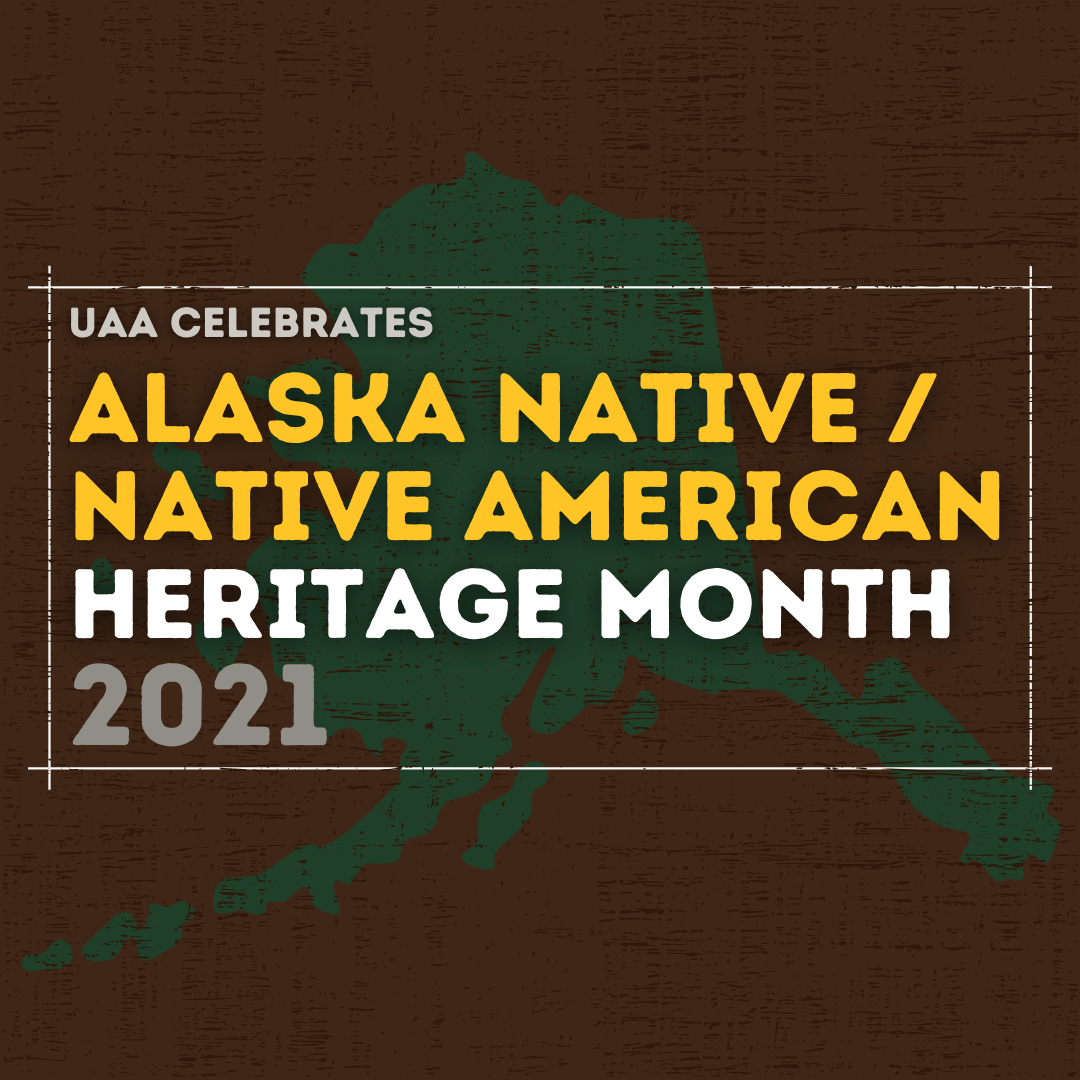
Alaska Native / Native American Heritage Events
November 3 | 5:00pm | Virtual | Conversation Cafe: Gender is a Colonial Construct
November 11 | 12:00pm | Student Union Den | Moving Beyond Land Acknowledgements & Token Representations
November 14 | 7:00pm | Virtual | Alaska Black Caucus panel: Indigenous Intersectionality
November 18 | 12:00pm | Virtual | Native Values Discussion
November 19 | 3:00pm | Virtual | Diversity Dialogue with Alaska Native Students
November 22 to 26 | Social Media | Alaska Languages and Land information Slide Deck
November 30 | 7:00pm | Multicultural Student Services & Virtual | Being IndigenousUAA / APU Consortium Library | Alaska Native/Native American Heritage Month
Native Student Services, Student Life and Leadership, Multicultural Student Services, Alaska Native, Indigenous, & Rural Outreach Program, Student Activities, Alaska Black Caucus, Recruitment & Retention of Alaska Natives into Nursing and Alaska Native Studies, UAA/APU Consortium Library.
-
Latinx Heritage Month (Sept. 15 - Oct. 15)
UAA is proud to celebrate Latinx Heritage Month Sept. 15 - Oct. 15. National Latinx/Hispanic Heritage Month celebrates and recognizes the contributions Latinx/Hispanic Americans have made to American society and culture and honors five of our Central American neighbors who celebrate their independence in mid-September. The recognition started with a week in 1968 and expanded to a month in 1988.
The word Hispanic, first coined by the Census Bureau as a means of categorization, refers to those who come from Spanish speaking countries. Latino/Latina (Latinx in gender expansive form) refers to those who come from countries in Latin America. While there is great overlap, not all Latin Americans speak Spanish and not all Hispanics are Latin American. The term Latinx also acknowledges the indigenous populations of Latin America who speak over 560 unique languages.
There is great diversity within Latinx communities, including ethnicity, food, music, folklore, art, religion, language and many of the other things celebrated during this month. To learn more about the variety of cultures, you can research specific countries of origin or learn about the immigration experiences of Hispanic/Latinx Americans. PBS has an extensive web series called Latino Americans that covers any topic you could want to know more about.
As always, when you are celebrating a culture that differs from your own, be sensitive to avoiding stereotypes about that culture. It is important to be aware of the difference between cultural appropriation and cultural appreciation, so that we are not disrespecting other people’s values, beliefs and norms.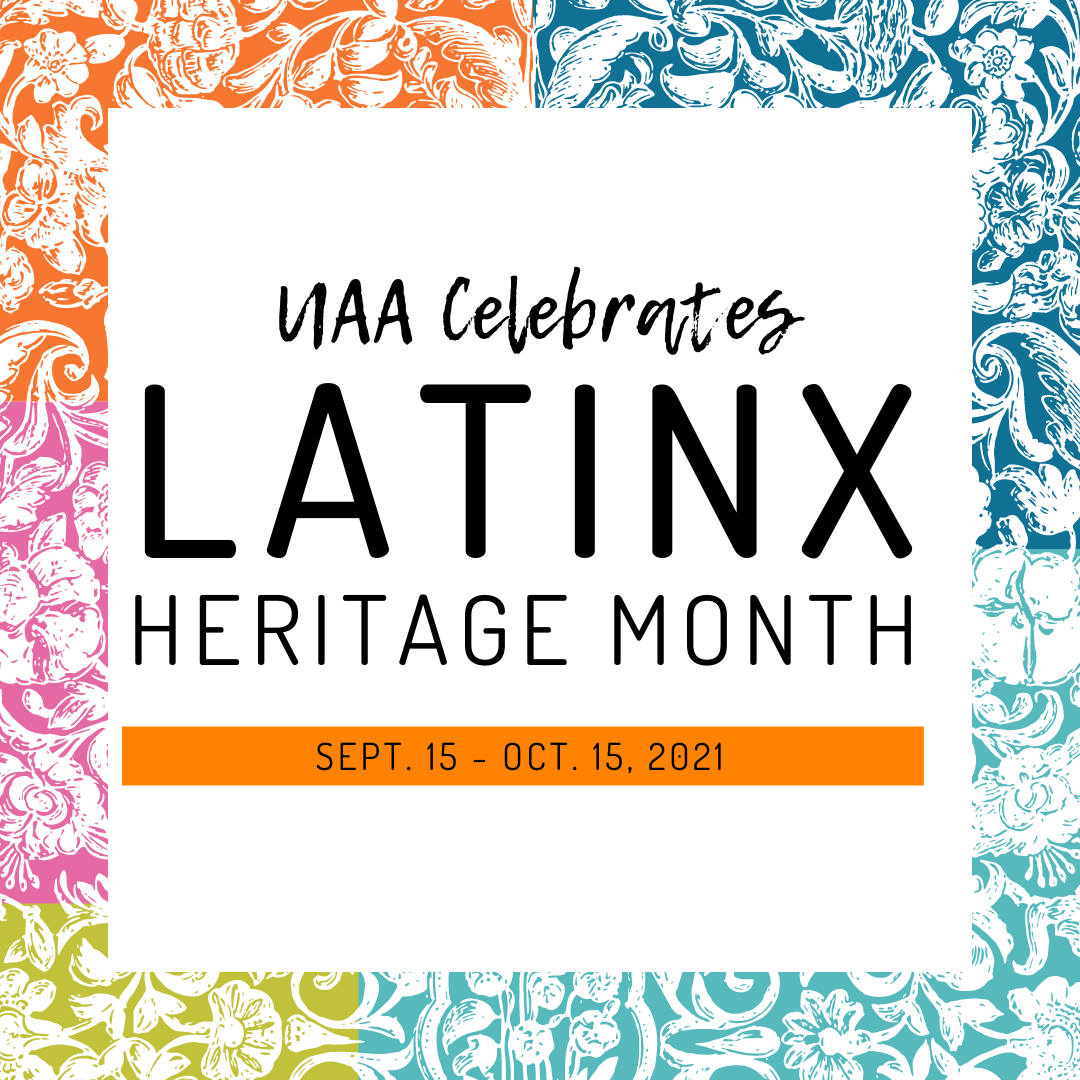
Latinx Heritage Month Events
Sept. 14 | All Day | Takeover Tuesday
Sept. 16 | UAA In The Community: Xalos
Sept. 23 | All Day | Online Trivia
Sept. 28 | 6:00pm | In The Heights Screening
Sept. 29 | 1:00pm | Conversation Cafe: Latinx Heritage Month
Sept. 29 | 7:00pm | Hugh McPeck Gallery Presents: George Rodriguez Artist Lecture
October 1 & 2 | Hugh McPeck Gallery Presents: George Rodriguez Guest Artist WorkshopAll Month
UAA/APU Consortium Library Guide
Follow UAALife on Instagram and Facebook for programming information and takeovers!
Sponsors: Student Life and Leadership, Student Activities, Multicultural Student Services, Career Services, Chief Diversity Officer, UAA/APU Consortium Library.
-
LGBTQ2S+ History Month (October)
UAA is proud to celebrate LGBTQ2S+ History Month. In 1994, a coalition of education-based organizations in the United States designated October as LGBTQ2S+ History Month. In 1995, a resolution passed by the General Assembly of the National Education Association included LGBTQ2S+ History Month within a list of commemorative months (Library of Congress).The month was selected to incorporate National Coming Out Day on October 11th.
LGBTQ2S+ is an acronym representing Lesbian, Gay, Bisexual, Transgender, Questioning and Two-Spirit. Some acronyms also include QIA at the end of LGBT, representing Queer (or Questioning), Intersex and Asexual. The acronym is an umbrella term meant to encapsulate a general community, but in no way is representative of all terminology, experiences or self-descriptions.
The month is celebrated in recognition of the history of LGBTQ2S+ civil movements and to demonstrate support and solidarity with the LGBTQ2S+ community. Information is available about the timeline and specific milestones in LGBTQ2S+ civil rights.
As always, when you are celebrating a culture that differs from your own, be sensitive to avoiding stereotypes about that culture. It is important to be aware of the difference between cultural appropriation and cultural appreciation, so that we are not disrespecting other people’s values, beliefs and norms.
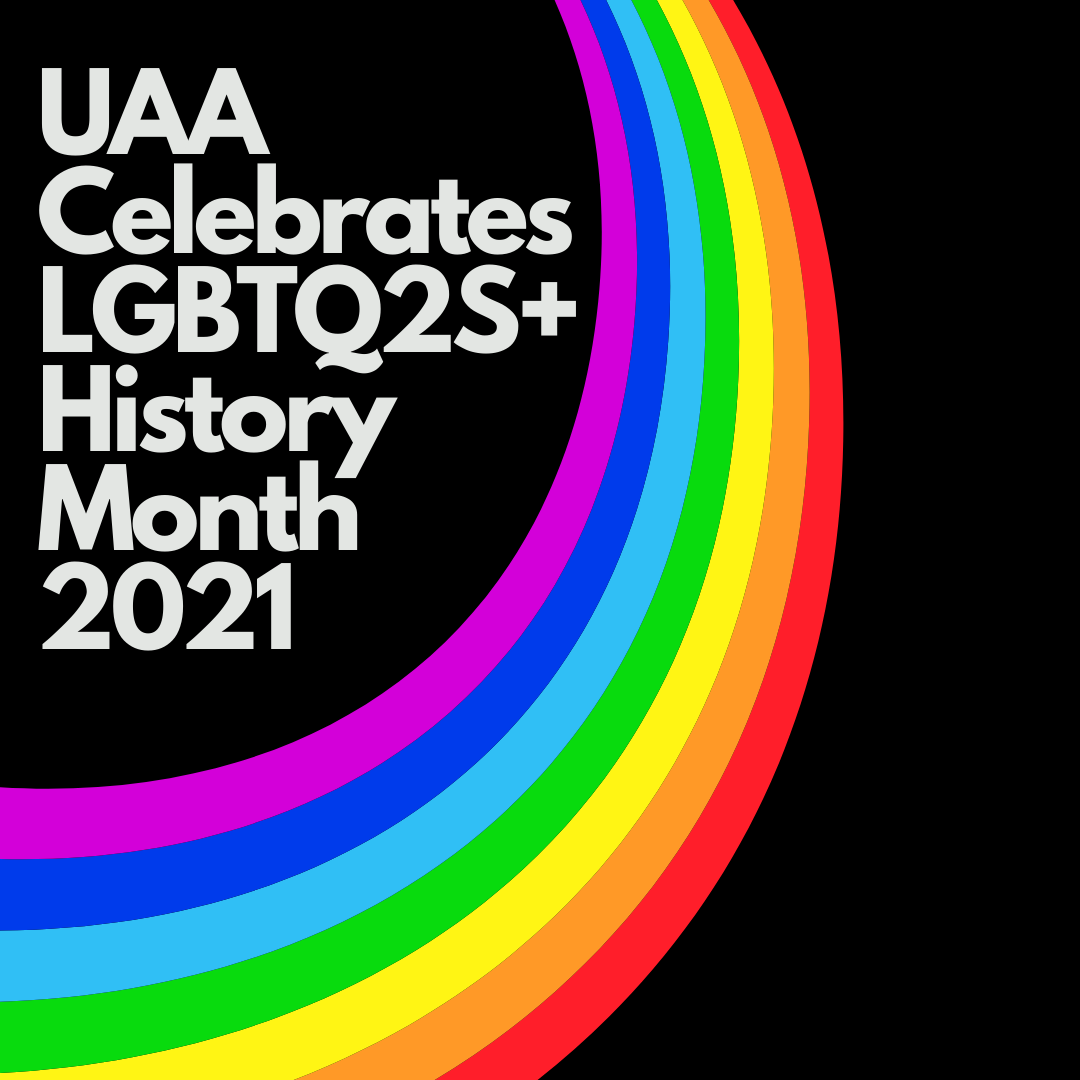
LGBTQ2s+ History Month Events
Oct. 20 | 6:00pm | Being QTBIPOC
Oct. 28 | 7:00pm | Queer Open Mic NightFollow UAALife on Instagram and Facebook for programming information and takeovers!
-
Filipino American History Month (October)
UAA is proud to celebrate Filipino American History Month. Filipino Americans are the second largest Asian American group in the United States. Filipino American History month is celebrated in October to commemorate the first recorded landing of Filipinos in America. This occurred in California in 1587. Congress gave official recognition to the month in 2009. Filipino Americans have a history going back over 200 years of living in Alaska. Called “Alaskeros” they were instrumental in working the canning industry and helping unionize cannery workers. Filipino Americans make up one of the largest ethnic groups in Alaska today.
For more information about the Filipino American experience, watch A Filipino American Story Since 1587 (7 minutes). For a modern and uniquely Alaskan perspective, read We Have Not Stopped Trembling Yet by UAA professor EJR David, PhD (available in text and e-text at the UAA Consortium Library).
As always, when you are celebrating a culture that differs from your own, be sensitive to avoiding stereotypes about that culture. It is important to be aware of the difference between cultural appropriation and cultural appreciation, so that we are not disrespecting other people’s values, beliefs and norms.
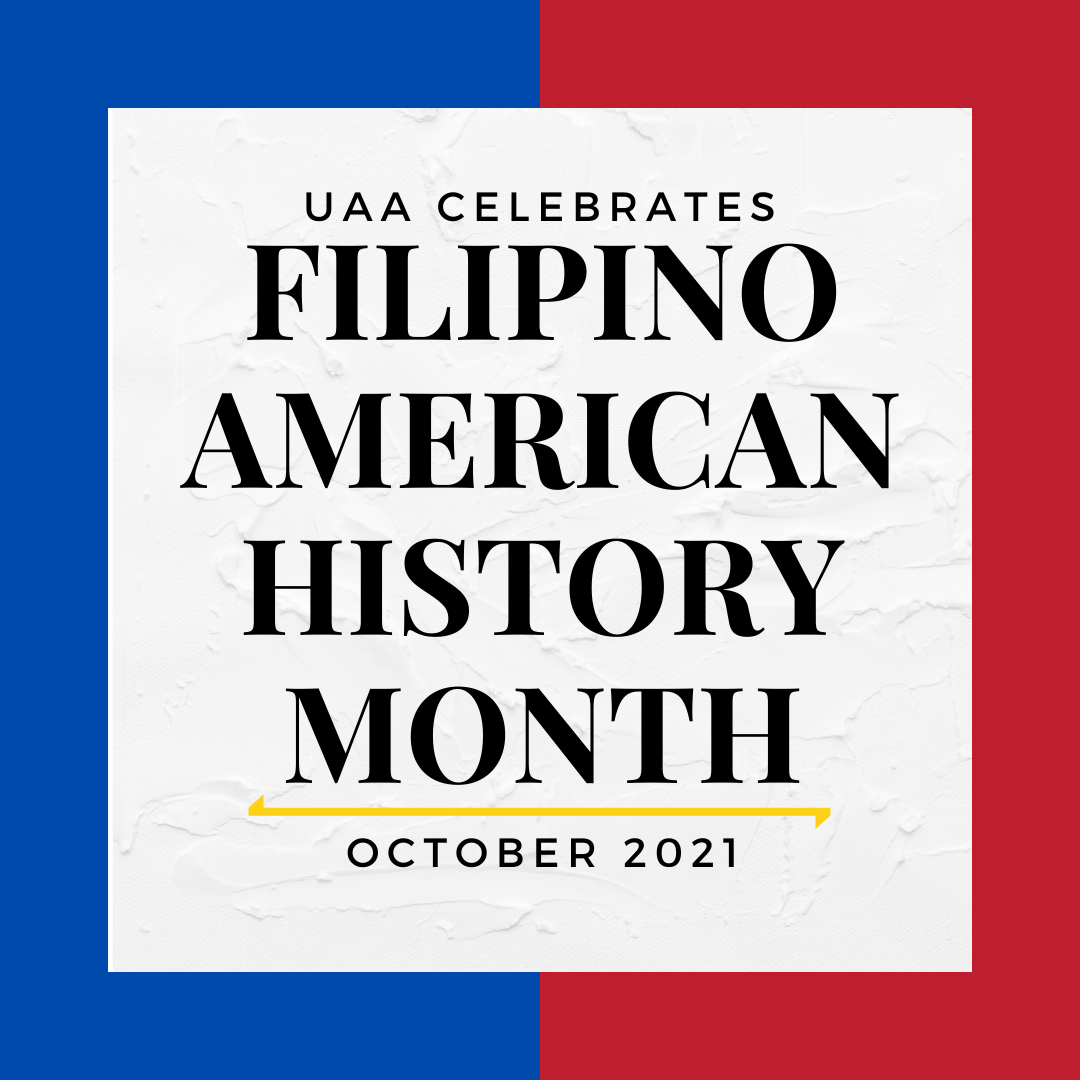
Filipino American History Month Events
Oct. 13 | 7:00pm | Open Mic Night With JR De Guzman
Oct. 22 | All Day | UAA Life Takeover
Week of Oct. 25 | Make Your Own Lumpia
Oct. 25 | 1:00pm | Being FilipinoUAA/APU Consortium Library Guide to Filipino American History Month 2021
Follow UAALife on Instagram and Facebook for programming information and takeovers!
-
Women's History Month (March)
- 2020-2021 Academic Year
-
Pride Month (June)
PRIDE refers to a celebration of all things lesbian, gay, bisexual, transgender, two-spirit (LGBT), as well as asexual, intersex, non-binary, queer and beyond! This includes LGBT history, music, fashion, celebrities, entertainment, culture and civil rights movements. Pride events are usually celebrated in June to celebrate the Stonewall riots in June 1969, when patrons of a New York gay bar protested and fought for their right to peacefully congregate.
You can learn more about the history of Pride movements at the History Channel website.
At UAA, we celebrate our LGBTQIA2S+ community with PRIDE everyday! This includes supporting students through student organization The Family, a new employee resource group (add link to event), history (October) and pride (June) month events, preferred name/gender pronoun selection in Banner, gender neutral restrooms, and LGBTQIA2S+ campus education/resource committee, and gender-neutral student housing.
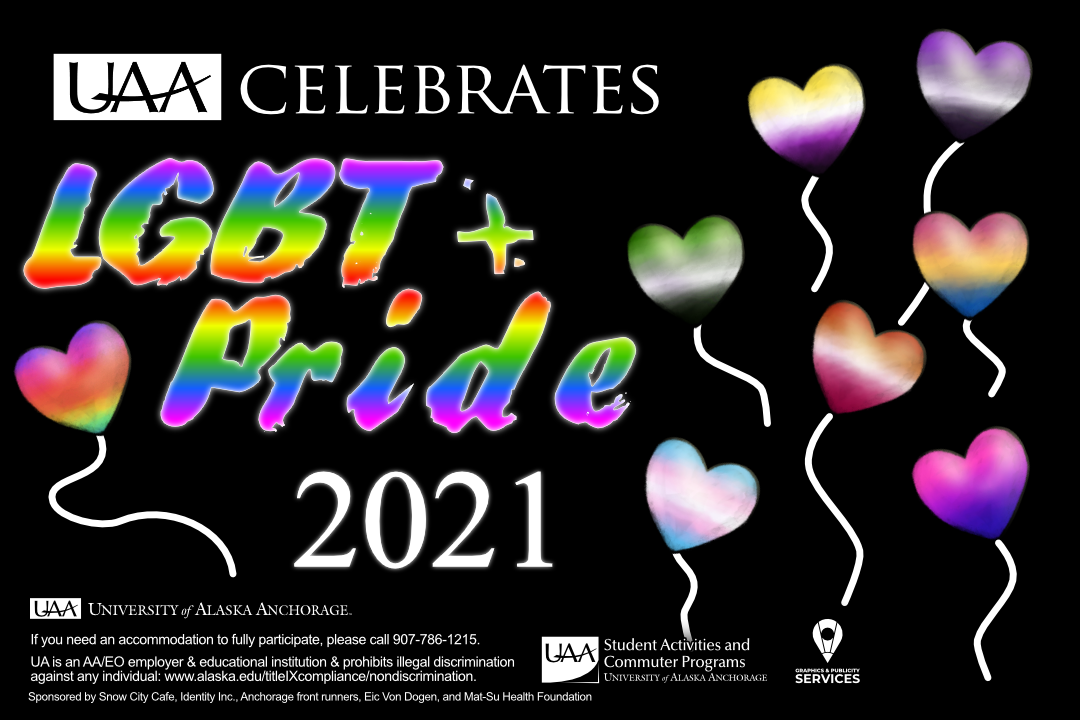
Pride Month Events
June 9 | 12:00pm | Lavender Leaders Panel
June 10 | 3:00pm | Faculty/Staff LGBT+ Resource Group Interest Meeting
June 12 | Until June 22 | Rainbow Run (Virtual 5K)
June 12 | 12:00pm | Soldotna Pride Walk 2021 (co-coordinated by LGBT: An Alliance Group at KPC)
June 17 | 10:00am | Translating Transgender Identity Abroad (Statewide)
June 22 | 6:00pm | Pride Pour Over Art
June 26 | 10:00am | Kodiak Pride Rainbow Run
June 26 | 2:00pm | Pride Block Party
June 30 | 6:00pm | Sunshine & Sandwiches Walk - YOUAA Celebrates Pride
All Month
Follow UAALife on Instagram and Facebook for programming information and takeovers!
Follow Career Services on Instagram & Facebook for inclusive LGBT+ inclusive workplace information.
Sponsors: Student Life and Leadership, Student Activities, Multicultural Center, Career Services, The Family, Native Student Services, Women’s and Gender’s Studies, LGBT Alliance at KPC, Chief Diversity Officer, Diversity Action Council
-
Asian American And Pacific Islander Heritage Month (May)
UAA is proud to celebrate Asian American and Pacific Islander (AAPI) Heritage Month. May was officially designated as AAPI Heritage Month in 1992. During this time, communities around the country celebrate the histories and contributions of Asian Americans and Americans from the Pacific Islands. These communities represent vastly diverse ethnicities, cultures, languages and histories in the United States.
The first Asians recorded in the US, on the West Coast in 1587, were from the Philippines. This was followed by Indians (East Asian, not Native American) at Jamestown, and the Chinese and Japanese in Hawaii at the turn of the 19th century. At the end of the 1800’s, people from Korea, Guam, Samoa and Vietnam all came to mainland US as well.
Much like in recent news, nationalist treatment of AAPI communities have long been frought with discrimination. The Chinese Exclusion Act, Japanese Internment during WWII, the colonization of Hawaii, Samoa and Guam, have caused great harm to these communities. Despite these atrocities, AAPI communities have made massive contributions to the success of the US in science, civil rights, technology, medicine and more.
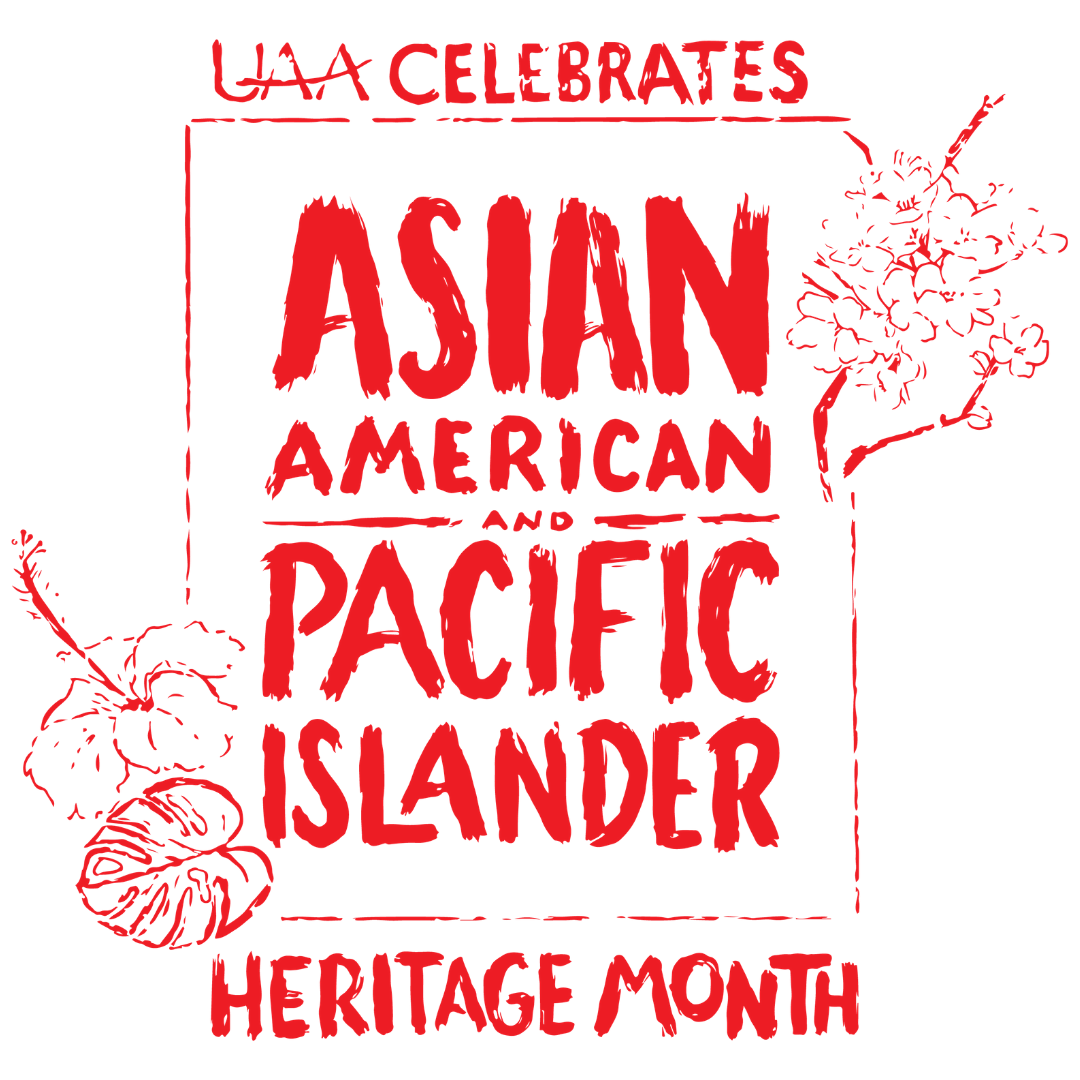
AAPI Heritage Month Events
May 1 | 1:00pm | Asian Pacific Islander Month Community Kick-off
May 6 | 11:00am | UAA in the Community: Papaya Tree Food Truck
May 14 | 8:00am | Bystander Intervention To Stop Anti-asian/American Harassment And Xenophobia Workshop
May 20 | 1:00pm | Bystander Intervention To Stop Anti-asian/American Harassment And Xenophobia Workshop
May 24 | 12:00pm | Bystander Intervention To Stop Anti-asian/American Harassment And Xenophobia Workshop
May 27 | UAA in the Community: Papaya Tree Food Truck
All Month
Follow Career Services on Instagram & Facebook for AAPI highlights!
Follow UAALife on Instagram and Facebook for Student, Faculty and Staff Profiles!
Trivia on UAALife
UAA/APU Consortium Library Guide to AAPI Heritage Month
Use #YOUAA or #YOUAAPI to get a free AAPI Heritage Month T-Shirt
Check out the PBS Documentary Series: https://www.pbs.org/show/asian-americans/ & https://www.nps.gov/subjects/npscelebrates/asian-american-pacific-islander-heritage-month.htm
Fill out the interest form if you want to be part of a new student organization for AAPI students. https://forms.gle/yXBmQFBJQ6ZeKuC97
-
Diversity Month (April)
This April, the UAA campus community is celebrating Diversity Month by celebrating the YOU in UAA.
You're invited to participate in a social media-based program that will highlight the diverse stories of Seawolves across the campus community. Throughout April, the YOUAA committee will publish a series of profiles collected from students, faculty, staff and alumni that focus on representing and celebrating their unique identity.
When we talk about diversity, examples of identities may include (but are not limited to) racial, cultural, religious, sexual orientation-based, gender-based and/or ability-related identities, etc. We welcome any and all representation!
Interested in sharing your story? By completing and submitting this form, you may be selected to be featured on the uaalife Instagram and Facebook pages.
Questions about this opportunity? Contact Allie Hartman.
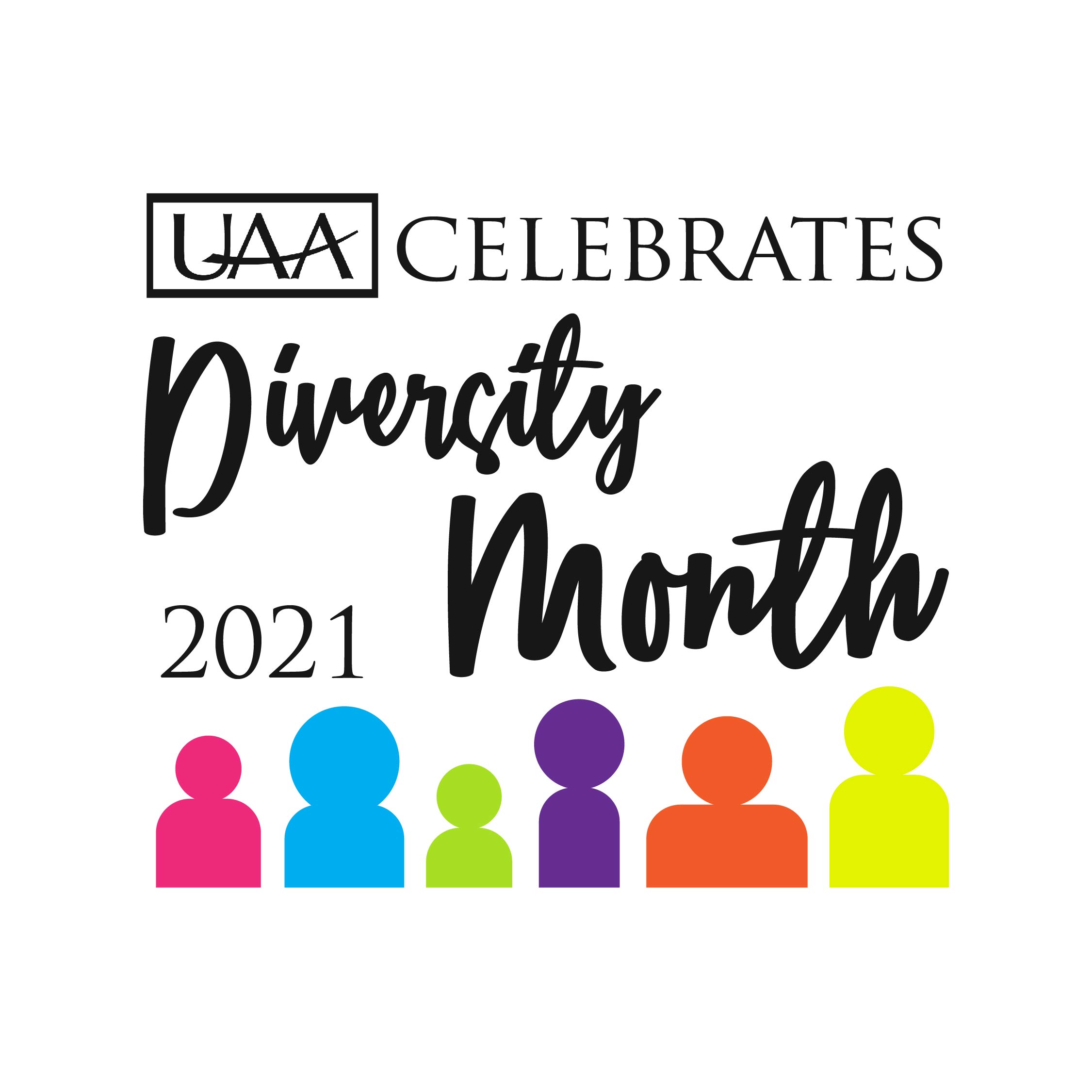
Diversity Month Events
April 7 | 12:00pm | Killing Me Softly: Suicide Among African American, Asian, Pacific Islander and LGBTQ+ Students
April 9 | 6:00pm | Veritas Forum
April 14 | 6:00pm | Philly D.A.
April 14 | 6:30pm | Big Questions: Are Science and Religion Compatible
April 15 | 11:00am | Papaya Tree
All Month | UAA's Got Talent
-
Womxn's History Month (March)
Womxn’s history month celebrates the unique contributions of womxn to American history. Womxn’s history month started as a week of celebration by a school district in California in 1978. The event grew until lobbyists convinced President Carter to declare a national week of celebration in 1980. In 1987, Congress declared March Womxn’s History Month.
Some major contributors to Womxn’s history include Susan B. Anthony, Sojourner Truth, Rosa Parks, Gloria Steinem, bell hooks, and so many more. Check out the amazing womxn’s history timeline from the History Channel to learn more about American womxn leaders throughout the decades. Alaska has also been a contributor to American womxn’s history through the work of many indigenous womxn trailblazers. Learn more (Not Available) about the contributions of Agnes Brown, Katie John, Elizabeth Peratrovich, Alberta Schneck Adams, and Clara Swan.
The Anchorage Museum is currently exhibiting Extra Tough: Women of the North. Through this exhibit, you can learn more about the everyday ways in which Alaskan womxn, particularly Alaska Native womxn, shape the history of the state and the Arctic region. During March 2021, please check out some of the events related to this exhibit.
*A note on the word WOMXN
Coming out of intersectional feminist circles and first used in 2010, the word womxn was added to many dictionaries in 2019. Womxn is intended to be a more inclusive term that acknowledges and indicates welcome for individuals who identify as women, including non-binary and trans women.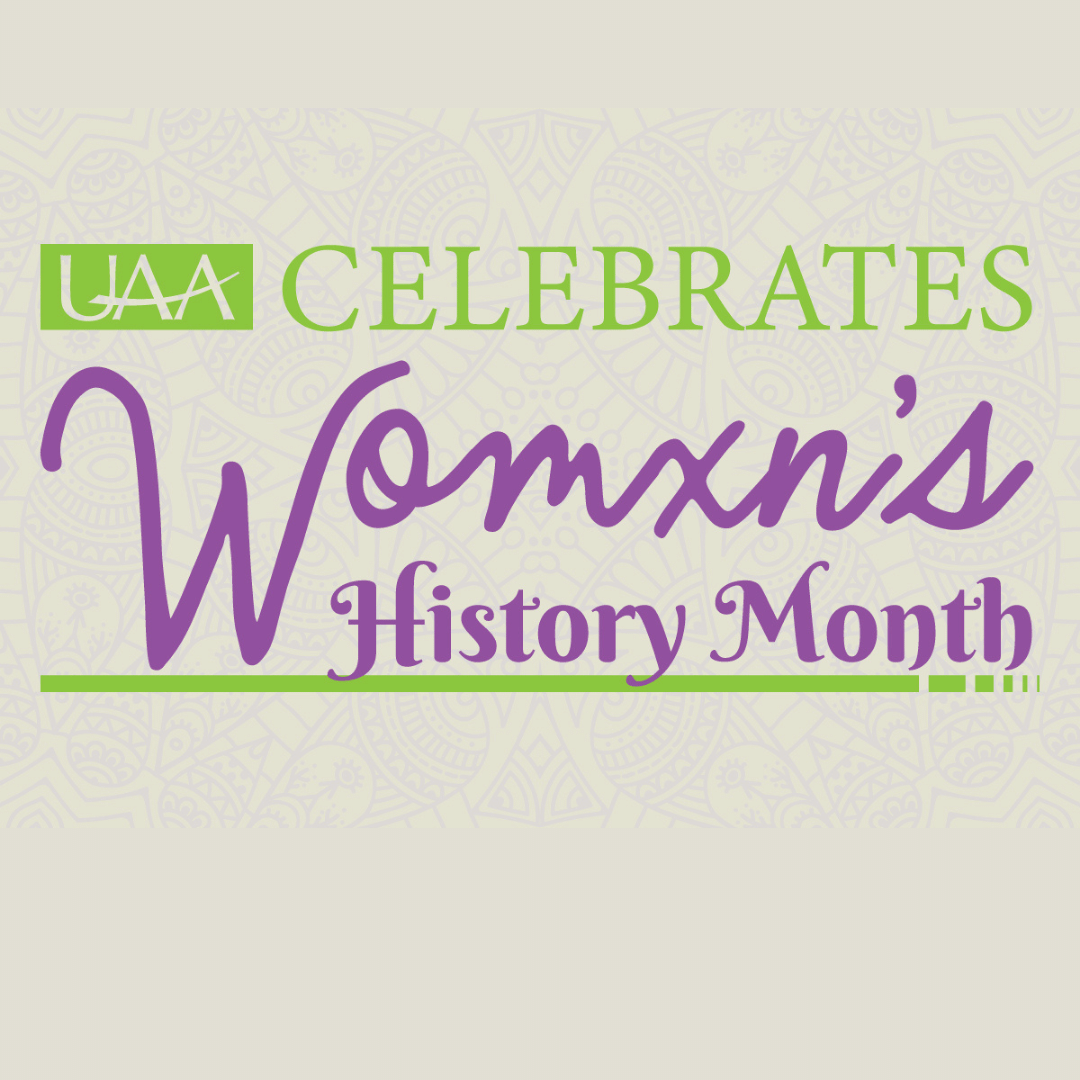
Womxn's History Months Events
March 1 | 6:00pm | Indie Lens Pop Up: 9 to 5
March 2 | All Day | Instagram Takeover
March 3 | 5:00pm | Maddie + Tae | University of Alaska Spring 2021 Virtual Tour
March 4 | 12:00pm | Extra Tough Women and Resilience in Crisis
March 5 | 4:00pm | Extra Tough Artist Spotlight: Suzy Lake + Allison Morris
March 4 | 7:30pm | UAA at the Movies: Legally Blonde
March 16 | 5:30pm | Warrior Women: Film and Discussion
March 19 | 6:00pm | Beat the Blame Game
March 20 | 7:00pm | UAA at the Movies: Promising Young Woman
March 25 | 6:30pm | Queer Femininity Panel
March 30 | 7:00pm | "Fair and Impartial Judges in Alaska" with Judge Elaine Andrews
All Month | Women’s History Month Library Guide
Social Media Trivia - Follow UAALife for weekly Trivia and the chance to win a $50 giftcard to a local business!
Sponsors: Student Life and Leadership, Multicultural Center, Student Activities, Native Student Services, Concert Board, Consortium Library, YouAA, Women’s Studies Program
-
Black History Month (February)
Black History Month started out in the United States in the ‘20s as a week that celebrated the birthdays of Abraham Lincoln and Frederick Douglass. Black History Month (BHM) was first celebrated as a full month in 1970 at Kent State University in Ohio. The month was recognized by the President of the United States in 1976.
Since then, Black History Month, sometimes referred to as African-American History Month, celebrations have included information on important historical events as well as leaders in African-American history such as Frederick Douglass, Harriet Tubman, Martin Luther King Jr., Malcolm X, Rosa Parks, James Baldwin and more.
In 2016, the U.S. opened the National Museum of African American History and Culture. It is the only national museum devoted exclusively to the documentation of African American life, history, and culture. You can explore the vast history of African Americans and attend virtual BHM events by checking out the museum’s extensive website.
In Alaska, African Americans have been a part of all aspects of development of the state going back almost two hundred years. This includes whaling, the military, engineering, building, and more. In 2020, UAA History professor Dr. Ian Hartman published Black History in the Last Frontier highlighting the achievements and contributions of Alaska’s Black community, while demonstrating how these women and men have endured racism, fought injustice, and made a life and home for themselves in the forty-ninth state. The book is available free for download from the National Park Service. -
Alaska Native/Native American Heritage Month (November)
UAA is proud to celebrate Alaska Native/Native American Heritage Month. In 1990, George H.W. Bush declared November to be Native American Heritage Month. It is now more commonly referred to as American Indian and Alaska Native Heritage Month. It is a time to celebrate the rich and diverse American Indian and Alaska Native histories and heritage, as well as educate ourselves about the historical and lived experiences of indigenous peoples who live(d) on the lands which became the United States.
There are five-hundred seventy-four (574) federally recognized American Indian and Alaska Native groups. Two-hundred and twenty-nine (229) of these groups are in Alaska. There are also hundreds of groups without federal recognition, who may have state recognition or no recognition at all.
In the lower 48, tribal nations are represented in 35 states across 334 recognized reservations. The current location of these sovereign nations and their lands is based on 500 years of colonization, removal, government treaties, and reorganization. The civil rights era of the 1960s saw movements for self-determination and self-government for American Indian nations. Today, seventy-eight percent of those who identify as American Indians live outside tribal lands. As of the last census AI/AN persons made up only 1.7% of the total US population, but are one of the fastest-growing populations with a 39% increase over the previous Census.
Alaska has a rich history of indigenous cultural practices. There are about 20 indigenous languages spoken in Alaska, and 11 of them are Dene’ or Athabascan, who are related to the Navajo and Apache in what is now New Mexico and Arizona. There 5 Inuit based languages; the Inupiaq of northern coastal Alaska, the Yupik of Saint Lawrence Island, the Yup’ik and Cup’ik of the Yukon-Kuskokwim region and Bristol Bay, the Sugpiaq or Alutiiq of Kodiak and the Alaska Peninsula, and the Unangax or Aleut of the Aleutian Chain, and there are the Eyak, Tlingit, Haida, and Tsimshian of the southeast archipelago. All of Alaska’s diverse indigenous populations have experienced difficult and dynamic transitions into the western culture and economy. The harshness of the geography and the lack of saleable resources in much of our state has left a few of Alaska’s indigenous cultures more intact if that were not the case. Annette Island, home of Alaska’s Tsimshian people, was developed before the Indian Reorganization Act of 1934, so it stands as the only reservation in Alaska. The rest of Alaska Tribes and Nations are organized into 12 Regional Corporations, Village Corporations and Tribal Nations due to the Alaska Native Claims Settlement Act (ANCSA) of 1971.
For more information on the diverse experiences and cultures of American Indians/Alaska Natives check out these resources:
National Congress of American Indians
Alaska Native Heritage Center
Native Movement
National Museum of the American Indian
Alaska Native Knowledge NetworkAs always, when you are celebrating a culture that differs from your own, be sensitive to avoiding stereotypes about that culture. It is important to be aware of the difference between cultural appropriation and cultural appreciation so that we are honoring and respecting other people’s values, beliefs, and norms.
-
LGBTQ2S+ History Month (October)
UAA is proud to celebrate LGBTQ2S+ History Month. In 1994, a coalition of education-based organizations in the United States designated October as LGBTQ2S+ History Month. In 1995, a resolution passed by the General Assembly of the National Education Association included LGBTQ2S+ History Month within a list of commemorative months (Library of Congress).The month was selected to incorporate National Coming Out Day on October 11th.
LGBTQ2S+ is an acronym representing Lesbian, Gay, Bisexual, Transgender, Questioning and Two-Spirit. Some acronyms also include QIA at the end of LGBT, representing Queer (or Questioning), Intersex and Asexual. The acronym is an umbrella term meant to encapsulate a general community, but in no way is representative of all terminology, experiences or self-descriptions.
The month is celebrated in recognition of the history of LGBTQ2S+ civil movements and to demonstrate support and solidarity with the LGBTQ2S+ community. Information is available about the timeline and specific milestones in LGBTQ2S+ civil rights.
As always, when you are celebrating a culture that differs from your own, be sensitive to avoiding stereotypes about that culture. It is important to be aware of the difference between cultural appropriation and cultural appreciation, so that we are not disrespecting other people’s values, beliefs and norms.
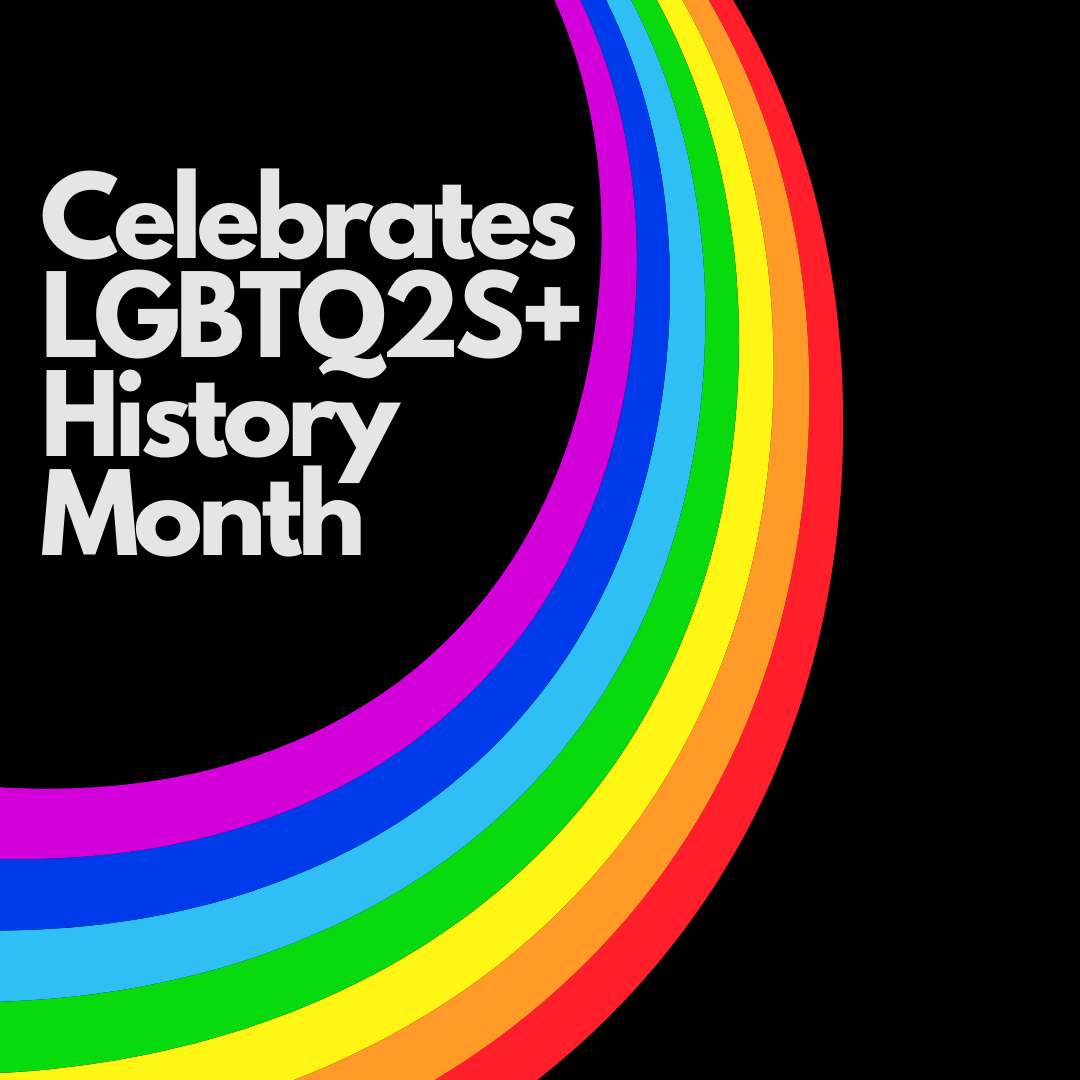
-
Filipino American History Month (October)
UAA is proud to celebrate Filipino American History Month. Filipino Americans are the second largest Asian American group in the United States. Filipino American History month is celebrated in October to commemorate the first recorded landing of Filipinos in America. This occurred in California in 1587. Congress gave official recognition to the month in 2009. Filipino Americans have a history going back over 200 years of living in Alaska. Called “Alaskeros” they were instrumental in working the canning industry and helping unionize cannery workers. Filipino Americans make up one of the largest ethnic groups in Alaska today.
For more information about the Filipino American experience, watch A Filipino American Story Since 1587 (7 minutes).
For a modern and uniquely Alaskan perspective, read We Have Not Stopped Trembling Yet by UAA professor EJR David, PhD (available in text and e-text at the UAA Consortium Library).
As always, when you are celebrating a culture that differs from your own, be sensitive to avoiding stereotypes about that culture. It is important to be aware of the difference between cultural appropriation and cultural appreciation, so that we are not disrespecting other people’s values, beliefs and norms.

-
Hispanic Heritage Month (Sept. 15 - Oct. 15)
UAA is proud to celebrate National Hispanic Heritage Month Sept. 15 - Oct. 15. National Hispanic Heritage Month celebrates and recognizes the contributions Hispanic Americans have made to American society and culture and honors five of our Central American neighbors who celebrate their independence in mid-September. The recognition started with a week in 1968 and expanded to a month in 1988.
The word Hispanic, first coined by the Census Bureau as a means of categorization, refers to those who come from Spanish speaking countries. Latino/Latina (Latinx in gender-neutral form) refers to those who come from countries in Latin America. While there is great overlap, not all Latin Americans speak Spanish and not all Hispanics are Latin American.
There is great diversity within Hispanic/Latinx communities, including ethnicity, food, music, folklore, art, religion, language, and many of the other things celebrated during this month. To learn more about the variety of cultures, you can research specific countries of origin or learn about the immigration experiences of Hispanic/Latinx Americans. PBS has an extensive web series called Latino Americans that covers any topic you could want to know more about.
As always, when you are celebrating a culture that differs from your own, be sensitive to avoiding stereotypes about that culture. It is important to be aware of the difference between cultural appropriation and cultural appreciation, so that we are not disrespecting other people’s values, beliefs, and norms.
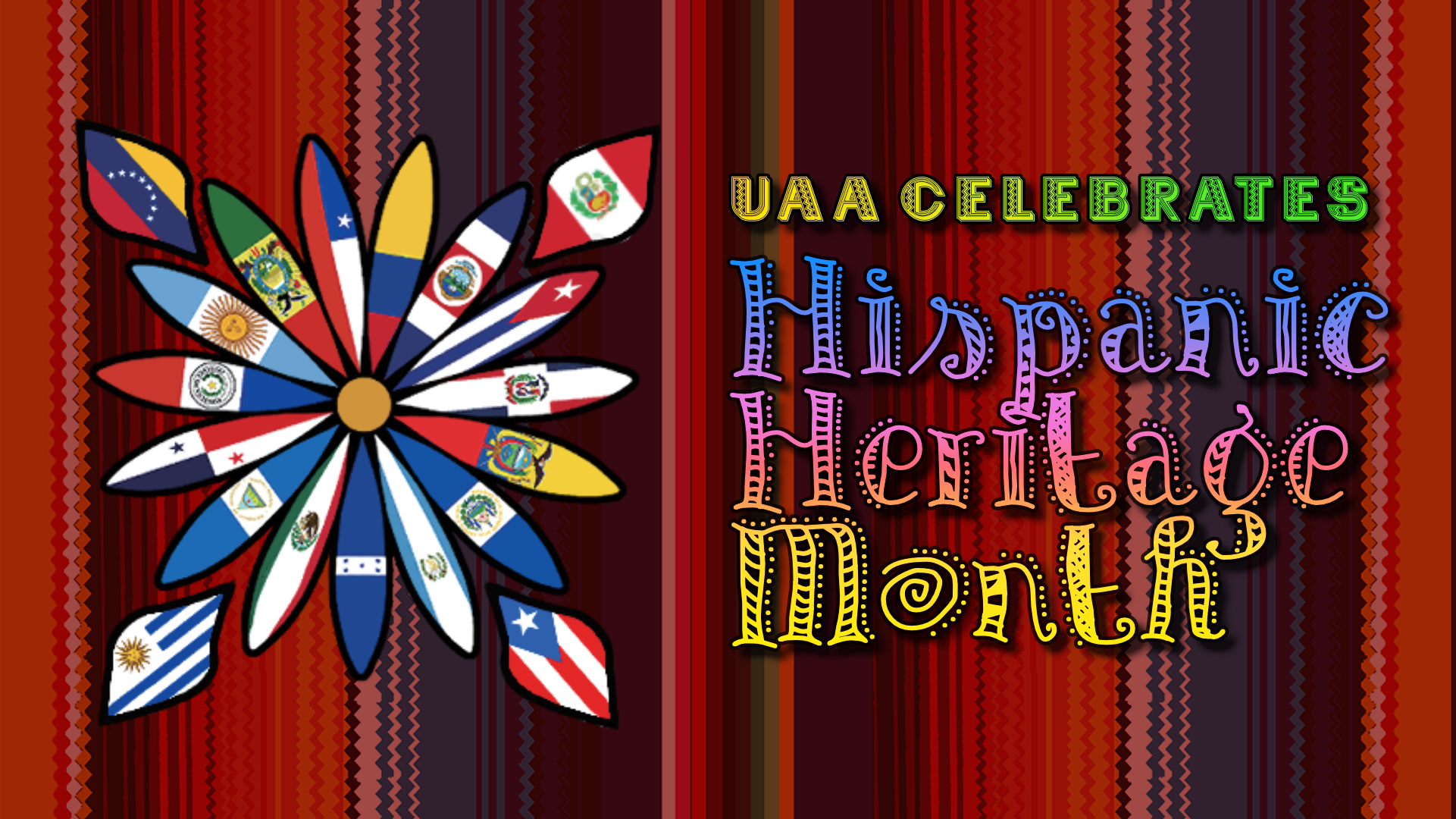
-
Pride Month (June)
- 2022-2023 Academic Year










